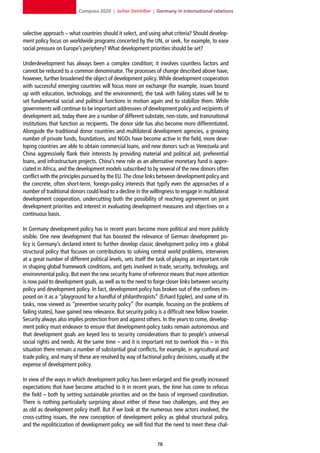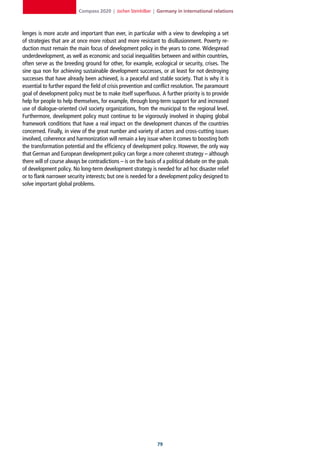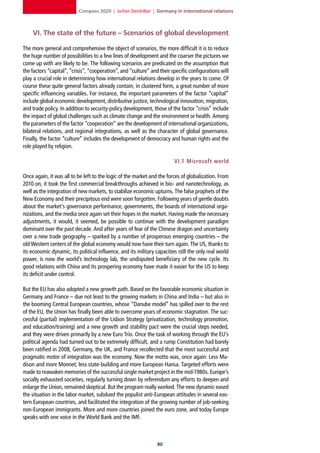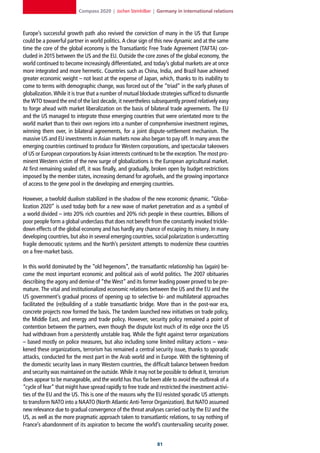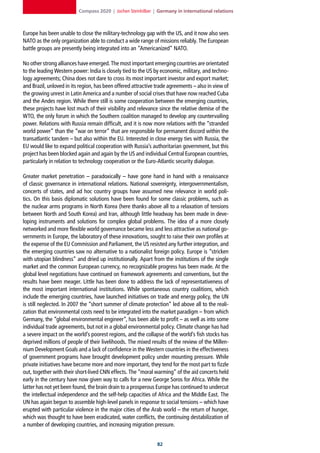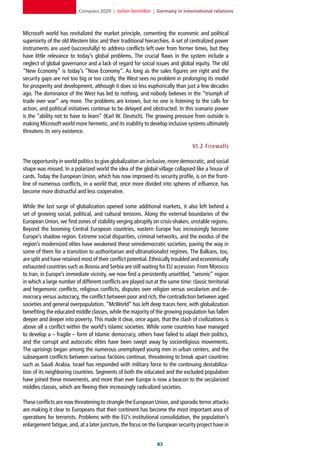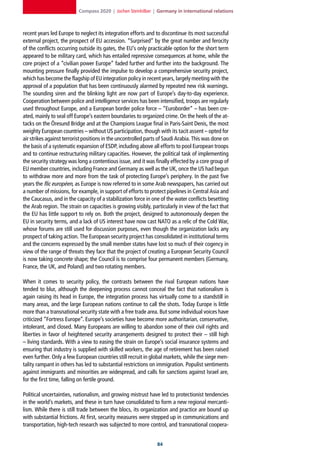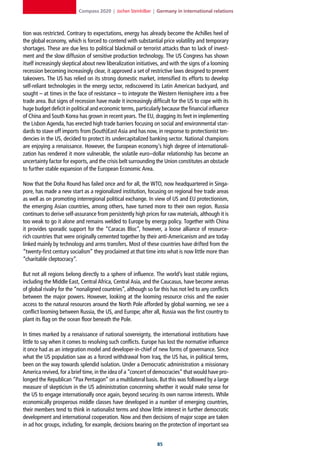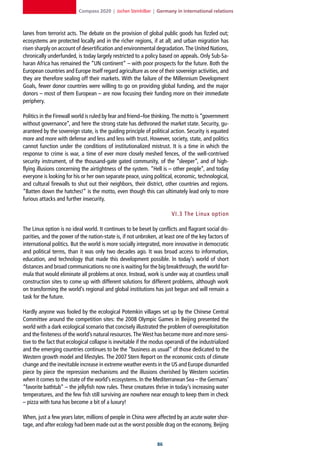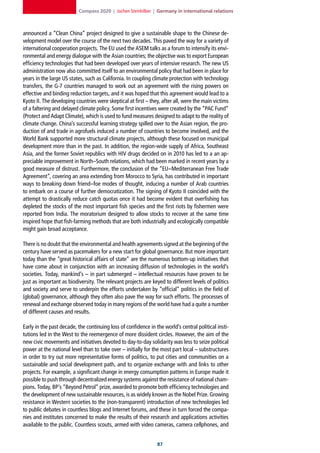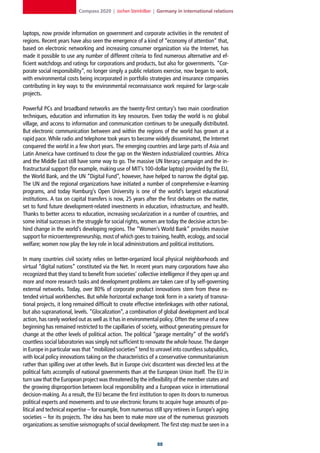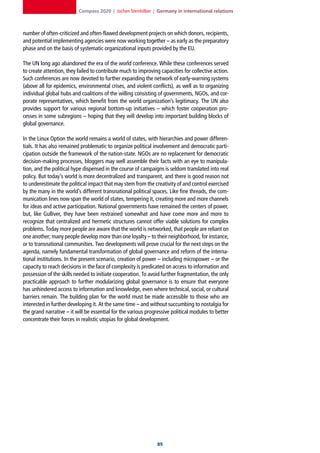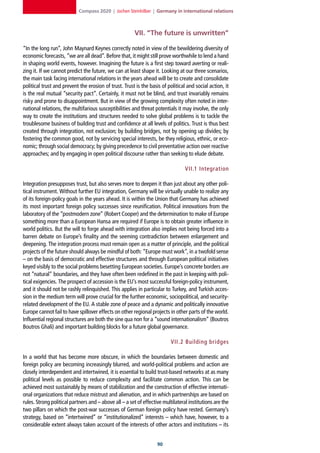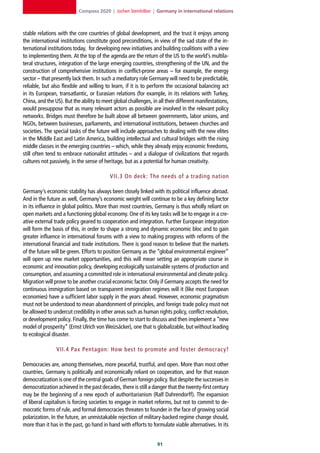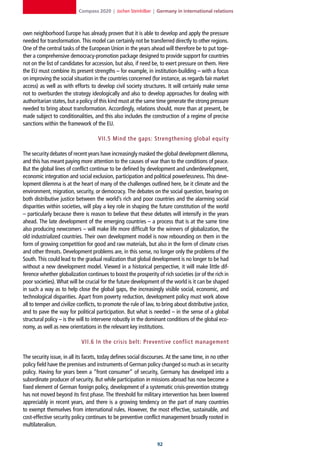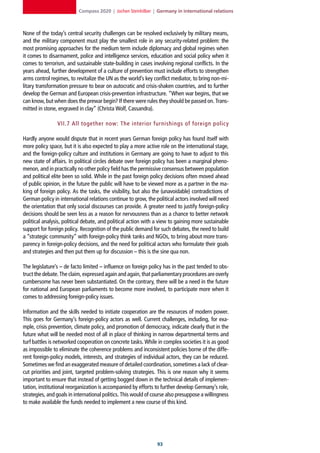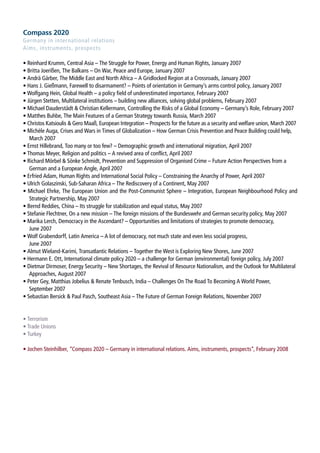This document provides an overview and introduction to the Compass 2020 project by the Friedrich-Ebert-Stiftung, which aims to stimulate discussion on Germany's foreign policy strategies over the next 15 years. It identifies eight major themes that will define international politics, including the global economy, demographics, technology, conflict/security, resources, human development, and governance. The project will analyze Germany's role and options for addressing challenges in these areas. It also notes growing complexity from interactions between these themes and risks of increasing social disparities both between and within countries.
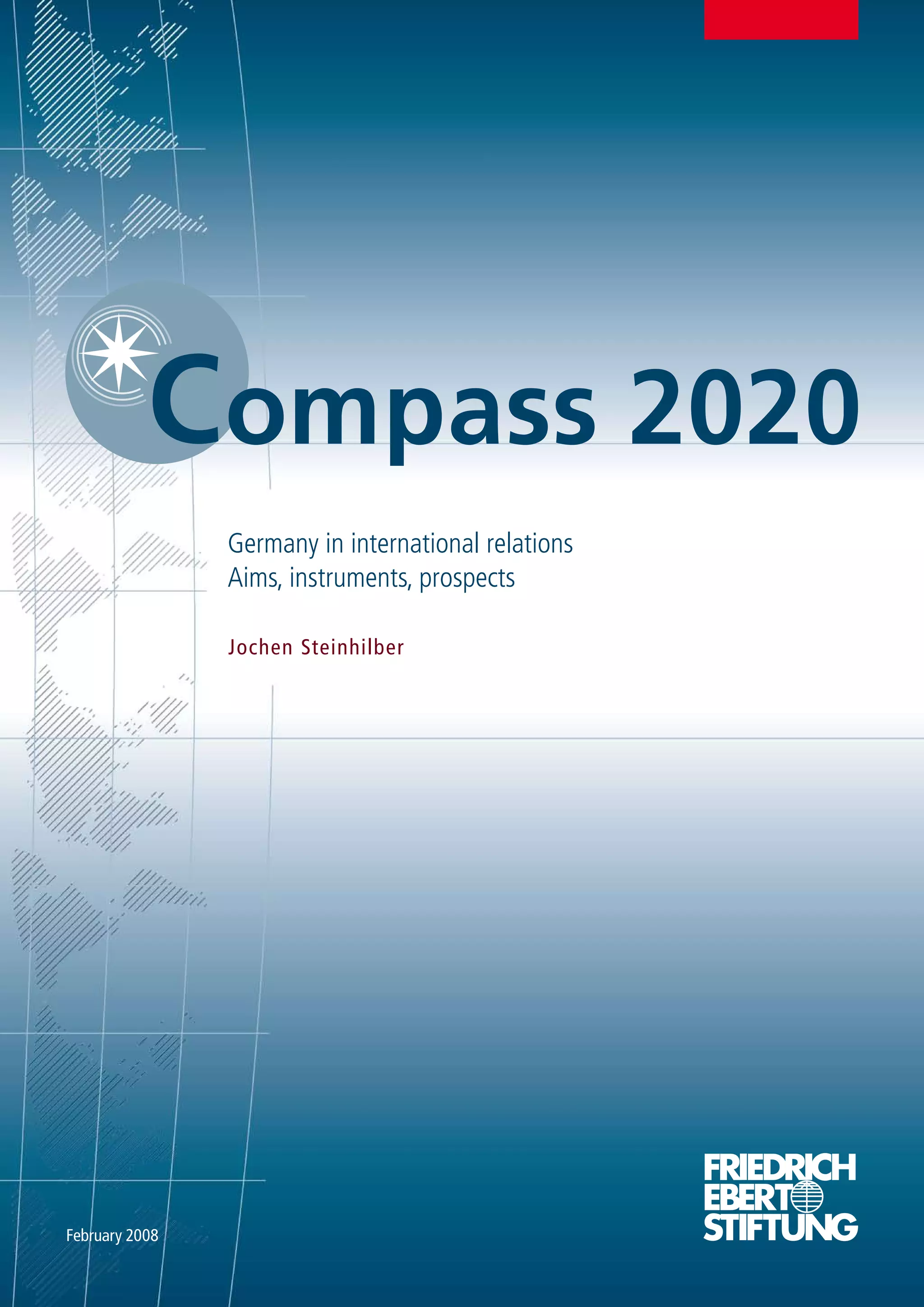
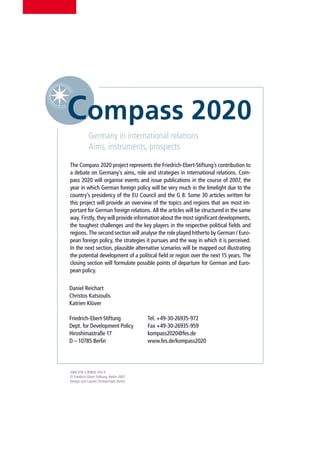
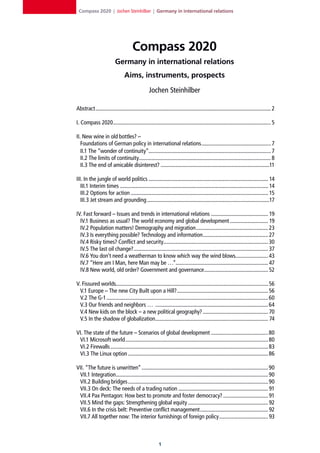
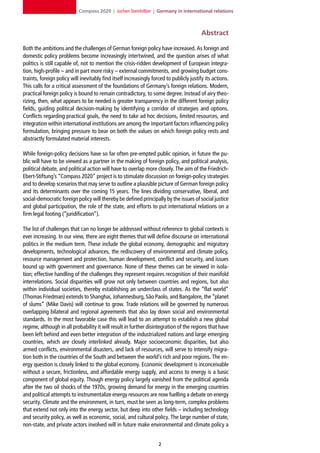
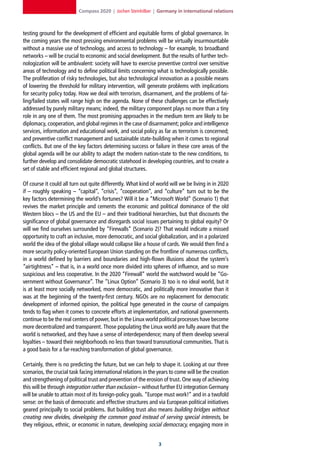
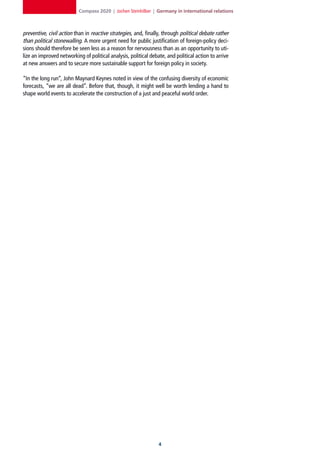
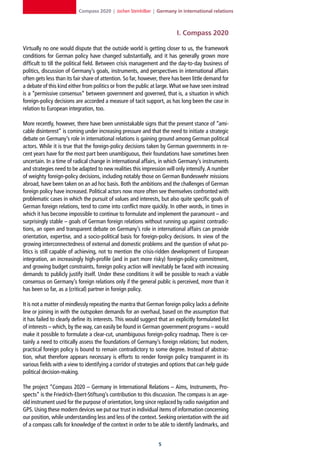
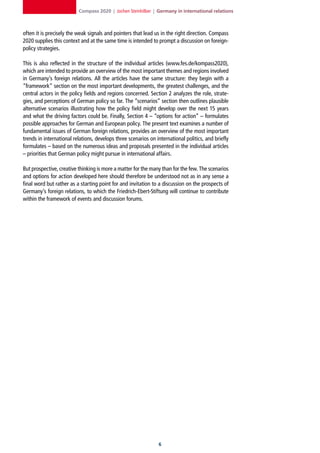
![Compass 2020 | Jochen Steinhilber | Germany in international relations
II. New wine in old bottles? – Foundations of German policy
in international relations
II.1 The “wonder of continuit y” 1
Contrary to what passing fads might sometimes lead us to believe, the foundations of German
policy in international relations have remained very stable over recent decades. This is all the
more surprising because Germany has been more affected by world-political upheavals than
virtually any other country. It therefore at least seemed reasonable to assume that these tec-
tonic shifts would shake the foreign policy foundations of a country that straddled the boundary
line of the global conflict that had just come to an end.
But little has changed in the core elements of Germany’s foreign relations since the mid-1950s.
These include the country’s commitment to use foreign policy to come to terms with Germany’s
past, its Western orientation, its skepticism regarding military force and renunciation of traditi-
onal power politics in international affairs, its integration efforts and deliberate renunciation of
a measure of its sovereignty, its efforts to promote peace and security throughout Europe, and
its worldwide respect for international law and human rights. A brief glance at the German go-
vernment coalition agreements and political position papers of the last 20 years is sufficient to
show that the sections dealing with international relations are for the most part concretizations
and variations of these core tasks. In its 1998 coalition agreement, the Red–Green German go-
vernment introduced some new points of emphasis as regards global issues (mainly concerning
development, environmental, and arms control policy); in 2002 the “war against terror” was
added as a new challenge in world politics. In the agreement establishing the present Grand
Coalition we find, alongside the familiar “construction sites” (European integration, Atlantic
partnership, security and stability throughout Europe, with Russia as a central partner, and
efforts to overcome the North–South divide) and some central global challenges (terrorism,
human rights, and proliferation), a special reference to promotion of sub- and interregional
cooperation, as well as a commitment to a “comprehensive security concept”.
In recent years Germany has experienced two more fundamental foreign-policy debates that
at least questioned this continuity. In the first years following Reunification, the discussion
revolved around whether Germany should engage more in power politics (keyword: “norma-
lization”), maintain its previous foreign-policy course, or step up its efforts to civilianize inter-
national relations (keyword: “civilian power”). The proponents of realism and “normalization”
concluded (and in part demanded) that in view of its rise to the status of “Europe’s central
power” (Hans-Peter Schwarz), its new “central position” in Europe, its increased population
due to Reunification, and structural changes in the international system Germany could now
– in contrast to past foreign-policy debates (keywords: “Western orientation”, “treaties with
the Warsaw Pact states”, “closing the arms gap”) – take a more independent tack in formu-
lating its foreign policy and so open up new strategic options. The proponents of continuity in
foreign policy opposed this view, pointing to the successes to which voluntary integration in
cooperative multilateral processes had led. For the future, a “Europeanized” Germany would
be best advised to forge ahead with deepening and expanding European integration, main-
taining its good relations with tried and tested international institutions. For their part, the
representatives of the civilian-power approach took the view that, against the background of
a more complex world-political setting, Germany now had a greater responsibility – but also a
greater capacity – to work towards the rule of law, protection of individual and collective civil
rights and liberties, and a reduction of pronounced social and economic disparities.
The call for Germany to pursue a more “self-assured power politics” more strongly oriented
towards national interests largely faded away unheard at the end of the 1990s. The “wonder
1] I would like to thank all my colleagues from the “Compass 2020” project for interesting discussions and helpful comments on the present text.](https://image.slidesharecdn.com/compass2010de-100605073420-phpapp01/85/Compass2010-de-9-320.jpg)
![Compass 2020 | Jochen Steinhilber | Germany in international relations
of continuity” (Josef Joffe) has also turned out to be the decisive factor in German foreign
policy in the Berlin Republic. But in 2003 the debate was renewed. In part with the old cast,
one variant of the debate on “continuity and change in German foreign policy” was replayed
– this time, though, more closely tied to political decision-making processes. What triggered
the debate was the Red–Green Coalition’s break with US foreign policy. But there were other
reasons as well, in terms of which the German government’s behavior was interpreted either
as a process of political emancipation or as a negligent break with the principles on which
German foreign policy success was based; examples included the accusation of German pur-
suit of self-interest in EU budget policy, the ongoing blockade in NATO, the close relationship
between Germany and France, or Germany’s aspiration to a permanent seat on the UN Security
Council. For some observers, the “foreign policy based on enlightened self-interest” called for
in robust terms by Chancellor Schröder and the talk of a special “German path” signaled (at
last) Germany’s “return to the world stage”; others would have preferred to cancel this appea-
rance altogether; while others spoke of a general erosion of Germany’s power to shape policy
in international institutions.2 But even the German government’s decision – which provoked
brief but fierce public discussions in Germany – not to take part in the war in Iraq failed to lead,
at least in the medium term, to more intensive efforts to deal with fundamental questions of
Germany’s foreign policy.
Nevertheless, what remains from these latent debates is an increasing suspicion that the pa-
radox of continuity in foreign policy in a rapidly and fundamentally changing environment is
now leading to more conflicts in decision-making and action, and that it is becoming increa-
singly difficult to formulate and implement the priority goals of German foreign relations – laid
down on the basis of societal and cross-party consensus – as if nothing had changed. The limits
of continuity are becoming visible.
II. 2 The limits of continuit y
Germany’s difficult broker role
In the past German foreign policy was characterized by the political will to bridge differences
and successfully apply the principle of “both/and”: France and the US, European integration
and transatlantic partnership, EU enlargement and consolidation. In recent years, however, it
has grown increasingly difficult for Germany, in looking for political solutions, to maintain this
equidistance and at the same time do justice to its role as honest broker and bridge-builder.
The overextension of this principle is due above all to a crisis of the institutions through which
these compromises were mostly reached.3 But induced by world-political changes, Germany’s
most important partners have also altered their political course, and this reorientation has
made it much more difficult to find common ground.
This instability is most clearly in evidence in Germany’s transatlantic relationship. If in the past
the principle applied in Germany’s efforts to mediate between European integration and tran-
satlantic friendship was a carefully considered “in dubio pro America”, transatlantic relations
have, within a few years, experienced an emotional roller-coaster ride – from “unreserved soli-
darity” after the 9/11 attacks to the termination of Germany’s allegiance over the Iraq war and
the frosty relationship that resulted. While even a few short years ago Richard Holbrooke could
still – in an entirely positive sense – term transatlantic relations as “one of the most boring
issues on the circuit, one that the policy freaks have fun with, year in, year out, at conferences
like the Munich ‘Wehrkunde‘ ”, today nobody is talking about stabilized boredom. Something
similar can be said of the large-scale construction site that Europe now is; here Germany in
2] Gregor Schöllgen, Der Auftritt – Deutschlands Rückkehr auf die Weltbühne, Berlin 2003; Gunther Hellmann, Sag beim Abschied leise Servus – Die
Zivilmacht Deutschland beginnt ein neues “Selbst” zu behaupten, in: Politische Vierteljahresschrift, 43, 2002; Hanns W. Maull, Auf leisen Sohlen
aus der Außenpolitik, in: Internationale Politik, 58/9, 2003.
3] Dieter Senghaas, Deutschlands verflochtene Interessen, in: Internationale Politik, 50/8, 1995.](https://image.slidesharecdn.com/compass2010de-100605073420-phpapp01/85/Compass2010-de-10-320.jpg)
![Compass 2020 | Jochen Steinhilber | Germany in international relations
particular has in past decades done its best to strike a difficult balance between enlargement
and consolidation, and thus to mediate between the interests of the member countries and
the EU’s neighbors. More recently, however, the tensions between internal and external go-
vernance capacity appear to be intensifying. And there are growing differences between the
winners and losers of enlargement and between those that see efficiency as the sine qua non
of enlargement, others who would prefer first to stabilize Europe’s young democracies, and
others still who seem intent on using enlargement as a means of subverting efforts to deepen
European integration. In the discourse on Europe, it seems, the both/and posited by the dual
challenge of the integration process is more and more assuming the character of an either/or
that requires an unambiguous decision in favor of one aim or another.
Institutional weaknesses
Germany has always accorded a large measure of consideration to the interests of other actors
and institutions when it came to defining its own foreign-policy interests. But Germany’s stra-
tegy of “intertwined” or “institutionalized” interests has never been either selfless or without
concrete aims, as was sometimes insinuated in post-reunification debates; indeed, mindful
of the need to develop political power and to bolster national prosperity, Germany has also
pursued a number of highly self-interested goals. The two pillars on which the successes of
this strategy rested in the postwar era were Germany’s strong political partners and, above all,
effective multilateral institutions.
Germany will – on the one hand – have to continue to exercise the major part of its interna-
tional responsibilities in the European context. On the other hand, complaints are increasing
about the alleged exhaustion of the European integration process. The European Constitution
has been shelved, at least for the time being, Europe’s internal structural heterogeneity is gro-
wing, and projects designed to deepen and enlarge the EU are highly contentious. Europe lacks
“charismatic” projects, and the German–French axis often seems to be more a sort of “bila-
teral unilateralism” than the driving force behind the European integration process. The “Euro-
phoria” previously encountered in European societies has given way to the insistent question:
“Why Europe?” – to which only lukewarm responses are forthcoming. Other “anchor institu-
tions” of German policy in international affairs are not much better off: NATO is searching for
a new raison d’être, the UN is groaning under the burden of its outmoded structures, and the
World Trade Organization is not seen as having much chance of becoming the backbone of a
stable and fair world trade regime.
Germany’s traditional roles in international politics – as a “motor of European development”,
a transatlantic partner”, a “civilian power”, an “integrated trading nation”, or an “honest
broker” – are, however, closely bound up with these institutions.4 Today the erosion of its abi-
lity to shape and sustain policy raises the question of how Germany is consistently to do justice
to these roles in the future.
Contradictions
The increased demands on Germany’s role in international affairs, the difficult foreign-policy
environment, institutional weaknesses, and the need for a strategic foreign-policy debate have
led to an increase in goal conflicts and practical dilemmas in German foreign policy – or at least
to their greater visibility.5 They are often traced back to tensions between (material) interests
and (normative) ideas, linked to the exhortation that it is now high time that Germany got
around to defining its interests more clearly. Both aspects figure prominently in the stock of
4] Adrian Hyde-Price, Germany and the European Order: Enlarging NATO and the EU, Manchester, 2000; Hanns W. Maull/Sebastian Harnisch (eds.),
Germany as a Civilian Power: The Foreign Policy of the Berlin Republic, Manchester, 2001.
5] Ludger Kühnhardt, Wertgrundlagen der deutschen Außenpolitik, in: Karl Kaiser/Hanns W. Maull, Deutschlands neue Außenpolitik,
Band 1 Grundlagen, Munich, 1994.](https://image.slidesharecdn.com/compass2010de-100605073420-phpapp01/85/Compass2010-de-11-320.jpg)
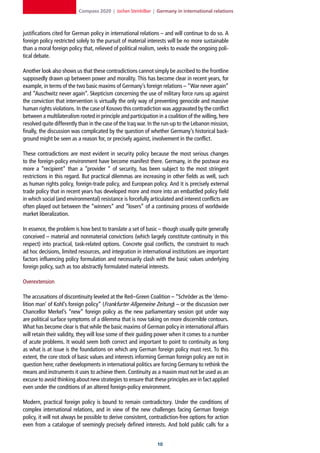
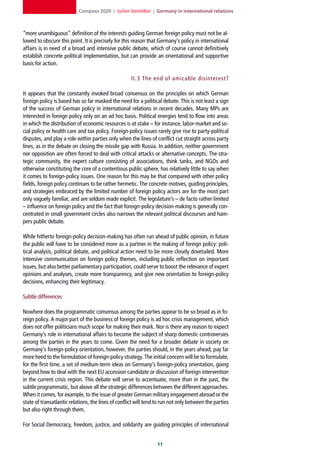
![Compass 2020 | Jochen Steinhilber | Germany in international relations
politics,6 and they hold in a globalized world as well, albeit under more difficult conditions. As
already mentioned, what is needed is to determine, with reference to these basic values, what
means and strategies are best suited to achieving the traditional goals of Social Democratic
politics under the conditions of changed international relations.
Substantial progress has been made in realizing the basic value of freedom, for example, with
the establishment of international criminal tribunals, the creation of the Office of the UN High
Commissioner of Human Rights, some progress on international law, and the most recent re-
form measures adopted at the United Nations (Human Rights Council, Responsibility to Pro-
tect, and Peace Building Commission), all of which appear to have met with broad acceptance
among different political currents.
Apart from a number of dossier questions that even today have opened up differences between
the major parties (for example, the issue of Turkish accession to the EU), the dividing lines
between conservative, liberal, and social democratic foreign policy are likely to be drawn above
all with reference to the issues of social justice and global involvement, government and go-
vernance, as well as the regulation of international relations and attempts to put them on a
legal basis. Social Democracy’s comprehensive idea of equality, which goes beyond the mini-
malist – primarily liberal or conservative – version of rights of privacy vis-à-vis the state and
also includes a materialization of rights of equality, must also be concretized in international
politics. What characterizes progressive politics in international relations is not only the specific
development-oriented debate about the consequences of oppression, persecution, and repres-
sion, but also the use of collective measures to eliminate the quasi-feudal structures of global
inequality. Social Democratic foreign policy should seek to establish global equity, much as in
the case of freedom, as a strong reference point right across the policy fields of international
relations – from poverty reduction and climate policy to technology and security issues.
Roughly the same can be said of the role of governance and collective decision-making pro-
cesses in international relations: while liberals and conservatives tend to play down the aspects
of governance and the state in the international arena, limiting them to issues of elementary
security (the latter also showing a tendency to pursue particularist or communitarian strate-
gies), a progressive foreign policy sees in efforts to create effective and inclusive institutions
and to regulate international relations and put them on a legal basis opportunities to civilianize
both international politics and the transnational economy. Market state or the reconstruction
of political sovereignties, a partial, morally induced concern with the social question, or efforts
to build an “organic solidarity” (Durkheim)7 – the responses to many pressing challenges of
international politics, such as climate, the environment, technology, the world economy, en-
ergy, migration, but also terrorism will be closely interlinked with these two sets of questions
– governance and equity.
Often a broad global perspective on international relations is too general and abstract, and
the great number of individual dossiers too minutely detailed and disparate to put together a
convincing and attractive policy package in the field of foreign policy. What is needed here is
an intermediate level that brings both aspects together, giving focus to foreign policy without
losing sight of the interdependencies in international relations. As far as strategy formation
is concerned, Social Democracy can draw on times in which foreign-policy visions and con-
cepts were developed for the longer term, while always being bound up with the day-to-day
business of politics: “new Ostpolitik”, “change through rapprochement”, “common security”,
and “structural incapacity to launch an attack” were medium-term political projects of this
kind, implementing basic Social Democratic principles of international politics. Even today
they remain the hallmarks of Social Democratic foreign policy, and have contributed to some
6] Wolfgang Thierse (ed.), Grundwerte für eine gerechte Weltordnung, Frankfurt, 2003.
7] Mathias Greffrath, Was heißt links, Die Zeit, 29, 14 July 2005.
12](https://image.slidesharecdn.com/compass2010de-100605073420-phpapp01/85/Compass2010-de-14-320.jpg)
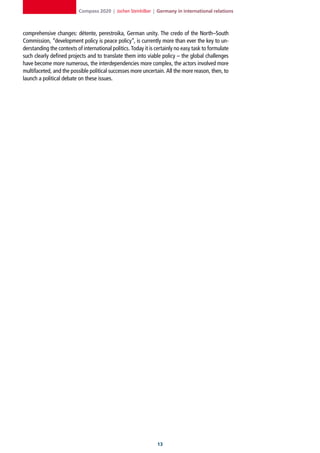
![Compass 2020 | Jochen Steinhilber | Germany in international relations
III. In the jungle of world politics
III.1 Interim times
One thing typical of interim times is that they are periods in which world-political upheavals
have already swept away the old structures and patterns of political action, without the new
ones yet becoming visible. There frequently are struggles over new interpretations, new visions
of the future are outlined, and political strategies are tried out and rejected in turn. Interim
times are ambivalent. They create uncertainty, though they also offer new spaces for the re-
formulation of policy.
The “balance of terror”, the Cold War’s repressive pattern with its clear-cut rules and routines,
has dissolved in a world in which the classic patterns and mechanisms of political categoriza-
tion no longer operate. “Uncertain”, “complex”, and “in constant change” are the attributes
most frequently used to describe world politics today. The fact that the boundaries between
domestic and foreign policy are becoming increasingly blurred, national processes are clo-
sely intertwined with global developments, and world-political action is widely networked,
interdependent, and interconnected, is now, just about everywhere, a standard formulation
in political science treatises and programmatic political speeches. The need to come to terms
with this interdependence and complexity has been recognized for some 15 years now as one
of the central challenges facing political action. The important features of this new complexity
are: the tensions between transnational networks and national sovereignty, the discrepancy
between global problems and effective capacities for solving them, the appearance of new
(transnational) actors on the international stage, the breakdown of a single, overarching “stra-
tegic narrative”, the ambivalent results of political intervention, and the new role of identity in
international relations.
The large number of discourses regarded as fundamental in international politics clearly shows
that it has become more difficult today to conceptualize concisely the phenomenon of “world
politics”. The end of the “short twentieth century”8 saw the emergence of a series of com-
peting worldviews that differ clearly regarding the determinative social forces of the present
world order, the role and the forms of morality and power in international relations, or the
probability of war and peace. Depending on individual tastes and inclinations, democratiza-
tion, globalization, technology and cyberspace, identity, and knowledge are identified as the
basic currents dominant in world politics. The range of the central political forces at work here
extends from tribes and ethnic groups, new nationalisms and cultural regions, through regional
organizations, investment banks, and transnational corporations to global institutions, NGOs,
knowledge networks, or the various forms of media.9 And the apotheoses of these narratives
could hardly be more different, with some projecting the crises of the present into a dire future,
while others depict a global village and a world with extensive zones of peace.
This all got under way with Fukuyama’s End of History. Having reached this point, it is claimed,
means not only that Western-style liberalism has carried the day over Soviet-style communism,
but also, in the long run, the end of wars between nations. For the time being, the argument
goes, the world is divided into one zone in which a durable “democratic peace” is in the pro-
cess of realization and another zone in which national-level conflicts will continue to emerge. It
is further argued, however, that its victory in the “struggle for modernity” will sooner or later
enable the Western model to pacify this zone as well. Interpretations that focus more on glo-
balization as the driving force of world politics have, since the early 1990s, been working on a
picture of the end of sovereignty in a borderless world (Kenichi Ohmae), a world in which, it is
suggested, economic globalization and technological progress will render the world’s borders
8] Eric Hobsbawm, The Age of Extremes: The Short Twentieth Century, 1914–1991, London: Michael Joseph, 1994.
9] Greg Fry und Jacintha O’Hagan (eds.), Contending Images of World Order, New York, 2000.
1](https://image.slidesharecdn.com/compass2010de-100605073420-phpapp01/85/Compass2010-de-16-320.jpg)
![Compass 2020 | Jochen Steinhilber | Germany in international relations
more porous, paving the way for the gradual disappearance of the nation-state. Nowadays
an Indian radiologist may analyze X-ray images overnight for US hospitals; and Bangalore
and Boston have become neighbors in a globalized world. It is often argued that the dot-
com boom, outsourcing, offshoring, and further differentiations of the international division
of labor, growing and prospering middle classes in the emerging countries, the entry of India,
China, and Russia into the global economy, as well as technological networking and improved
exchange of knowledge have created a level playing field for the world economy: the world has
become flat (Thomas Friedman)!
In view of the violent breakup of Yugoslavia, the “discovery” of Islamic fundamentalism, and
the growing disparities between and within the world’s societies, however, doubts accumu-
lated concerning whether the much advertised triumph of liberalism and globalization’s pro-
mise of prosperity for all would in fact be realized so quickly. Instead of focusing on universalist
ideas of the world, these images were more strongly keyed to conflict, fragmentation, and the
“unflat world”. Samuel Huntington’s image of the clash of civilizations is certainly one of the
most controversial, but also most politically influential. Here, cultural, ethnic, and religious
identities become important factors in the development of the coming world order. In the
process sharp conflicts are likely to develop along the borders of civilizations – what German
geographer Alfred Kolb called “culture continents”. Huntington sees the interests and role of
“the West” in the globalized world threatened by the Confucian and Islamic regions’ gains in
economic, political, and demographic power – and in particular by a possible alliance between
them. Robert Kaplan’s essay “The Coming Anarchy”, which was faxed to all US embassies in
1994, focused on the fragmentation or “Balkanization” of the world. Kaplan saw the collapse
of a number of states in West Africa as a harbinger of a zone of anarchy that, characterized by a
mixture of demographic developments, social collapse, new wars, and massive environmental
problems, was bound to increase the pressure on the prosperous parts of the world. Robert
Cooper’s The Post-Modern State and the World Order may be seen as a variant here, but it is
also one of the few pictures with a European perspective: the triptych it presents consists of a
postmodern world defined largely by the European Union, and characterized by transparency,
close interlinkages, and relinquishment of national sovereignty; a modern world that continues
to be dominated by the logic of the system of nation-states and the iron law of sovereignty;
and a premodern world characterized by conflict and failed states. The long-term goal is, ac-
cordingly, to extend the postmodern zone. If the premodern world threatens the other worlds,
Cooper argues, they should respond with a “liberal imperialism” that imposes human rights
and law and order – if necessary by creating “liberal protectorates”. Cooperative worldviews
have a hard time of it in this debate. Two examples that might be cited in this connection
are Rostow’s The Coming Age of Regionalism, which sees regional cooperation organizations
going through a phase of consolidation and becoming important building blocks of global go-
vernance, and the notion that the common and interrelated problems facing our endangered
planet may also lead to new forms of global governance.
This struggle between interpretations is not merely a matter of academic exercises; these
images of the world, for the most part highly accessible, frame the political debates, provide
orientation, and so become increasingly attractive precisely in times of uncertainty.10 Not least,
a number of concrete strategies and options for action are based on them.
III. 2 Options for action
We can distinguish three different options concerning how politics should respond under the
conditions imposed by complex structures of order.
10] Paul Reuber/Günther Wolkersdorfer, Auf der Suche nach der Weltordnung? Geopolitische Leitbilder und ihre Rolle in den Krisen und Konflikten
des neuen Jahrtausends, Petermanns Geografische Mitteilungen, 148, Heft 2, 2004.
1](https://image.slidesharecdn.com/compass2010de-100605073420-phpapp01/85/Compass2010-de-17-320.jpg)
![Compass 2020 | Jochen Steinhilber | Germany in international relations
New foes
Many of the abovementioned world pictures depict worlds divided into two: Fukuyama’s End
of History breaks the world down into democracies and non-democracies, Huntington’s Clash
of Civilizations pits the West against a Confucian–Islamic alliance, and in Robert Kagan’s world
Mars (America) and Venus (old Europe) vie for the interpretation of the world and the under-
standing of power and morality. 9/11 was the catalyst that brought together, in one political
strategy, a number of interpretations previously thought to be incompatible. From Fukuyama’s
“the West is the best” and Huntington’s “the West against the rest” emerged the political
idea of the “good civilization”:11 from Fukuyama it inherited the notion that the model of the
Western democratic market economies could without further ado be transferred successfully to
all other regions and countries. And from Huntington it received the conviction that the “good
civilization” bloc is in a position to formulate a common will and that there is no neutral ground
in the confrontation – “Those who are not with us are against us”.
The popular German scare literature on the economic rise of Asia, for example, Weltkrieg um
Wohlstand [The War for Wealth], tends to underline Germany’s frontline position vis-à-vis the
“Asian attackers”, and then calls for the creation of an “economic NATO”. In the West – and
most influential worldviews are of Western origin – there appears to be a new longing for
more clear-cut contours in world politics. New, seemingly clearly defined dichotomies are now
to close the gap in our worldview left by the vanishing of the friend–foe schema of the Cold
War period, the aim being to reduce the complexity of the political environment. The charm
of clear-cut fronts is that they tend to mobilize, polarize, and provide orientation; but instead
of leading to adequate solutions, they for the most part lead only to political dead ends and
spurious certainties.
Political bankruptcies
In view of the complexity or “general drama of politics”, others – not without interests of their
own – are already calling for the instigation of bankruptcy proceedings, claiming that the pos-
sibility of any effective, change-inducing, and efficient collective action has come to an end.
In this view, politics, mostly commented on in cynical terms, is at best capable of moderating,
suppressing problems, or cosmetic corrections. Talk of the “delusion of feasibility” does no
more than paraphrase the desire to retain the status quo. Variants include constant references
to the “reform logjam” and related complaints about the state, its political class, or the intran-
sigence of its citizens, as well as an effusive crisis discourse, coupled for the most part with a
good measure of cultural pessimism. In the end, these two views lead not to constructive ef-
forts to attain new scope for action but on the contrary to a further delegitimization of political
action – and occasionally to outbursts of antidemocratic sentiments as well.
Doing it the hard way
A third option is – admittedly – the calmest, the least tangible in ad hoc terms, and the most
difficult to sell – but in the long run it will nevertheless prove to be the most promising. It is pre-
dicated on the assumption, first, that complexity, be it on a European or a global scale, must be
endured; second, that global conditions are shaped in accordance with ideas and interests, not
without engendering uncertainties; and third, that it is therefore worth trying to come to terms
with complexity, without falling prey to a naïve optimism about governance. The dominant
insight here is that binding global regulatory frameworks and bodies of rules have contributed
to civilizing relations between states (and within states); that global and regional cooperation
lead not to more but to less complexity, since trust serves to reduce complexity and uncertainty
as well as to regain room to maneuver; that what is therefore needed in turbulent times is
11] Graeme Herd/Martin Weber, Forging world order paradigms – “Good Civilization” vs. “Global Terror”, in: Security Dialogue, 32/4, 2001.
1](https://image.slidesharecdn.com/compass2010de-100605073420-phpapp01/85/Compass2010-de-18-320.jpg)
![Compass 2020 | Jochen Steinhilber | Germany in international relations
not any self-granted dispensation from global rules but steadfast efforts to further develop
a global governance that at present is still selective in nature; and finally, that what we have
reached is not the end of history but only the beginning of a discussion on efficient and viable
policy networks of regional and global scope.
III. 3 Jet stream and grounding
Coming to grips with complexity will not be an easy task. There is little reason to believe that
the picture will begin to brighten soon. As an overarching trend, the “jet stream”12 of interna-
tional politics, globalization will continue to be the key frame of reference for the relationship
between economy, politics, and society and to determine political discourses. At the same
time, uncertainty may be seen as constituting the “grounding” of social development, against
which background options and strategies of political action are developed.
Globalization
The narrow form of globalization – the compression of economic processes and market pe-
netration – will continue to gain ground, boosted above all by technological progress (com-
munication, information, and transportation) and its further diffusion. The consequence will
be a growing accentuation of the effects of globalization and challenges in other areas – for
instance in terms of patterns of culture and consumption or of political control – as well as a
growing awareness of the significance of global developments for society and individual per-
sonal development.
But the Janus face of globalization has continued to take shape. The process of globalization,
at least in its current form, is a long way from pursuing the path to the “global village”. While
it may be said to have a homogenizing effect by incessantly penetrating new regions and coun-
tries and integrating markets, at the same time globalization tends toward fragmentation by
generating development and conflict alike, opening up opportunities for societies but increa-
sing their vulnerability, producing both winners and losers, and deepening the divide between
those who are “networked” and those who are “disconnected”. The splendor and the misery of
globalization clash both between and within societies: social integration but also marginaliza-
tion, stable but also precarious social and economic conditions, global lifestyles and a longing
for the “authentic” here confront one another.
But “globalization”, the embattled key concept of the 1990s, is bound to lose some of its ideo-
logical clout in the industrialized Western countries. The proponents of a euphoric globalization
project, who emphasize the blessings of globalization, and its dedicated opponents, who point
darkly to the curse of the global economy, have already made way for a more sober-skeptical
view of the matter: here globalization is neither good nor bad, but a process some of whose
individual aspects – such as the worldwide networking made possible by modern information
technology – appear to be irreversible, but whose forms can in principle be shaped politically
and so remain contested
Uncertainty
The ambivalent aspects of the globalization process create uncertainty and so contribute to a
basic social sentiment that has intensified in the Western industrialized countries, too. In many
regions of the world a manifest uncertainty associated with the day-to-day threat posed by
hunger, disease, repression, and war has long been a constant of human development. While
there the elementary pillars of human security described by Kofi Annan – freedom from fear
and want and freedom to live in dignity – are all too often porous, the industrialized countries
12] Albert Bressand, Shell Global Scenarios to 2025, The Future Business Environment: Trends, Trade-Offs, and Choices, Royal Dutch/Shell, 2005.
1](https://image.slidesharecdn.com/compass2010de-100605073420-phpapp01/85/Compass2010-de-19-320.jpg)
![Compass 2020 | Jochen Steinhilber | Germany in international relations
have experienced the rise of a diffuse sense of uncertainty, or insecurity, that has attracted
more political and public attention than virtually any other issue.
As early as the 1980s, and in connection with Chernobyl, Challenger, and Waldsterben [dying
of the forests], the first “risk warnings” were to be heard emanating from the midst of the
industrialized societies. In recent years, however, uncertainty has become a permanent state of
affairs, combining different dimensions: internal and external, personal and societal, military
and social. The surrounding world seems “desecuritized”, and what the unsettled members
of twenty-first-century Western “risk societies” (Ulrich Beck) long for most is “comprehensive
security”. Along with freedom and justice, security ranks very high in opinion polls on what
people consider the most congenial ideas, and in three different ways: security as reliability
of regulations and societal continuity; as social, existential security; and security as personal
integrity.13
There are many reasons for this sense of insecurity. The growing “social vulnerability” (Manuel
Castells) of Western societies is one important factor. A sizable portion of society has already
been forced to bid farewell to “zones of social cohesion”, regular employment and basic social
welfare; others, such as the greater part of the middle classes, live in constant fear of this pre-
cipitous social plunge.
Moreover, conflicts spilling over from an apparently “desecuritized” world into a Western “nor-
mality” believed to be secure and prosperous have opened our eyes to the vulnerability of mo-
dern societies – and not only since 9/11. From the perspective of Western societies, the largely
routinized Cold War confrontation was replaced by a “new obscurity” that has – as noted often
enough – lost its key ideological, regulative, and military coordinates. While the threat posed
by the “balance of terror” appeared to be manageable, the clear rules of the Cold War no
longer apply to today’s uncertainty phenomena; growing social uncertainty is aggravated by a
sense of threat induced by terrorist attacks, climate change, crime, financial crises, pandemics,
and virtual viruses. Cracks have appeared in the promise of security held out by modernity,
which is based on the notion that risks are increasingly controllable.
Acknowledging risks is certainly not always a rational process. But even without shrill alar-
mism and incessant apocalyptic pronouncements, societal insecurity is bound to become a
paradoxical challenge for politics in the years ahead, and political space must not be sealed off
from society’s anxieties. What is called for is careful efforts to deal with them and – wherever
possible – to eliminate their root causes. At the same time, the desire for security – and the
state’s reaction to it – should not become so great that people come to regard as a refuge a
strictly controlled polity that increasingly restricts their freedom. The need for societal security,
which can be satisfied only vaguely, often gives rise to a call for “emergency measures”. In
fact, this relies more on encouraging people to provide for their own security, to relinquish
what are claimed to be “risky” freedoms, to accept the return of the Leviathan state and
more social control. However, the real risks and threats facing societies can best be alleviated
on the basis of a “problem-solving multilateralism” that focuses more on collective security,
cooperative elements, transparency, opportunities for exerting influence democratically, and
liberalization.
13] Zygmunt Baumann, Hochseilakte können nur die wenigsten wagen, in: Freitag, 34, 2005.
1](https://image.slidesharecdn.com/compass2010de-100605073420-phpapp01/85/Compass2010-de-20-320.jpg)
![Compass 2020 | Jochen Steinhilber | Germany in international relations
IV. Fast forward – Issues and trends
in international relations
The list of political challenges we are unable to deal with without consideration of global con-
texts has grown longer and longer in recent years. In our view there are eight issues that will
define discourses in international politics: the global economy, developments in demography
and migration, technological advances, the rediscovery of environmental and climate policy,
the management and protection of resources, human development, conflict and security, and
issues of government and governance. None of these issues can be looked at in isolation from
the others; in fact, they are in many respects interrelated in terms of both the problems in-
volved and the strategies that might resolve them.
IV.1 Business as usual? The world economy and global development
Integration …
Thanks to technological advances and better diffusion of information and communication tech-
nology, economic globalization will, in the years to come, continue to integrate new markets
and regions. In 2020 aggregate world output will have reached levels some two thirds above
that of today, exhibiting growth rates similar to those of the past 30 years. The key factors
responsible for this development will include the penetration of new trade markets, increasing
capital mobility, and a rapidly growing middle class, not only with greater purchasing power,
but also with higher expectations concerning efficient economic management. Worldwide,
financial services, media and entertainment, health, education, and travel will be among the
most important growth sectors.
The Western economies will see their share of industrial manufacturing continue to decline,
although most Western countries – Germany above all – will continue to be important ma-
nufacturing locations for high-tech products. Global markets will be dominated by some 500
multinational corporations, whose international division of labor will continue to fragment.
At the same time, small, highly specialized firms will become increasingly important for niche
products and high-tech innovations.
Assuming that current trends continue, the US, mainly due to its young demographic profile
and high level of innovation, will continue, at least for the coming decade, to be the world’s
largest economy, with average growth rates of 3%. Japan will have trouble exceeding 1%,
and the EU member states are – on average – likely to attain figures somewhere in between,
though rates in the new Eastern European member states are likely to be somewhat higher.
Economic relations between the US and Europe – which at present amount to roughly 2.5
trillion dollars and account for roughly 12 million jobs in the US and Europe – will remain the
world economy’s most important economic axis. In the foreseeable future, no other bilateral
constellation will even come close to reaching the high degree of interpenetration and integra-
tion typical of the transatlantic economy: nearly 75% of the FDI flowing into the US comes from
Europe (2003), while the US accounts for 65% of Europe’s FDI.
Nevertheless, the economic triad (EU–US–Japan) that has so far set the pace in the world eco-
nomy will see itself exposed to greater competition from the emerging markets: in the next 15
years China’s economy – the world’s workshop – will triple in size and continue to gain ground,
particularly in manufacturing.14 Unlike India, however, China faces the problem of having to
get rich before it grows old: the declining growth rates forecast for China from 2012 onwards
will be due to the aging of the Chinese population (see Demography and Migration). India, the
14] Bernd Reddies, China: Its struggle for stabilization and equal status, Compass 2020, Friedrich-Ebert-Stiftung, Berlin, 2007.
1](https://image.slidesharecdn.com/compass2010de-100605073420-phpapp01/85/Compass2010-de-21-320.jpg)
![Compass 2020 | Jochen Steinhilber | Germany in international relations
global service provider, could turn out to be the world’s growth champion, and its huge pool
of well-trained, English-speaking specialists constitutes a reservoir of cheap labor and an ex-
panding market for consumer goods. Services in the fields of software development and high-
tech research and production of high-grade goods, for example, for the health sector – the
subcontinent already leads the world in the production of generics – will be the driving forces
behind India’s growth. But it remains to be seen whether India’s “leapfrog” development, con-
centrated in the highly qualified service sector and tending to neglect the industrial sector, will
prove able to generate sufficient jobs for the younger generation, so tackling the social ques-
tion at least to some extent.15 Economic expansion in the newly industrializing Asian countries
is also fueling the economic boom presently under way among the world’s large resource-rich
and agricultural economies – above all Russia, the world’s energy pump and major producer
of fossil fuels, but also metals, and Brazil, one of the world’s major producers of food and raw
materials and one of Asia’s major suppliers of iron ore, copper and nickel, soybeans, and beef.
… and exclusion
While for the foreseeable future the large emerging countries will be able to profit from the
trickledown effect of the world economy, entire regions face the threat of being left behind. So-
cial disparities will grow both between countries and regions and within the world’s societies,
with an underclass of states crystallizing in the process.
In the coming years the regions with the highest rates of population growth will have the
lowest share of world market growth. The development of the Middle East/North Africa re-
gion depends far more than other regions on rents, and the welfare disparities between the
region’s resource-rich and resource-poor countries are accordingly large. The region is on the
whole poorly integrated into world markets – its shares in world trade (3.4%) and foreign
direct investment (just 4%) are among the world’s lowest – and it also has a very low level of
intraregional trade. Apart from Tunisia and Morocco, there is little reason to believe that the
countries in the region are about to embark on a program of economic reform or that – even
more importantly – the region’s resource-rich countries are likely to diversify their economies
beyond oil and gas production. Israel alone accounts for 50% of the region’s non-oil exports.
But even the region’s resource-rich countries will face problems in creating sufficient new jobs
to absorb the region’s rapidly growing working-age population in the coming ten years.
While Sub-Saharan Africa’s16 share of world trade declined to 2% in 2005, the region has ex-
perienced a gradual upturn at the local level. Its growth rates have ranged around 5%, with
resource-rich countries such as Nigeria leading the way in posting strong increases. But this
development starts out at a very low level and the chances are not good that by 2020 Sub-
Saharan Africa will reach growth rates that – as in the case of China and India – are sufficient
to contribute significantly to reducing poverty; low productivity, falling prices for agricultural
products, growing competition from Asian developing countries (for example, in textile pro-
duction), low levels of foreign direct investment, a continuing predominance of rural structures,
poor infrastructure, underdeveloped middle classes, political instabilities, and poor governance
– all these factors are likely to exacerbate an economic situation that is already very difficult.
The region’s only exception is South Africa.
Compared with the past decade, Latin America’s economic development is likely to improve,
although it will remain far behind the dynamics of India, China, and Southeast Asia. Led by
Brazil, the region is likely to concentrate above all on raw materials and food.17 Growth op-
15] Peter Gey/Matthias Jobelius/Renate Tenbusch, India: Challenges On The Road To Becoming A World Power, September 2007, Compass 2020,
Friedrich-Ebert-Stiftung, Berlin, 2007.
16] Ulrich Golaszinski, Sub-Saharan Africa: the rediscovery of a continent, Compass 2020, Friedrich-Ebert-Stiftung, Berlin, 2007.
17] Wolf Grabendorff, Latin America: A lot of democracy, not much state and even less social progress,
Compass 2020, Friedrich-Ebert-Stiftung, Berlin, 2007.
20](https://image.slidesharecdn.com/compass2010de-100605073420-phpapp01/85/Compass2010-de-22-320.jpg)
![Compass 2020 | Jochen Steinhilber | Germany in international relations
portunities for the South American economy lie mainly in agribusiness and mineral processing.
As far as the industrial sector is concerned, the countries of the region are faced with strong
competitive pressure, above all from China. Much will depend on whether the countries in the
region succeed in creating a functioning single South American market and reaching agree-
ment on a joint development model that also has public support.
While the flat world (Thomas Friedman) extends to Shanghai, Johannesburg, São Paolo, and
Bangalore, the planet of slums (Mike Davis) will also continue to expand. The phenomenon
of a rapidly growing global middle class able to afford the consumption characteristic of the
Western industrialized countries, as well as an anticipated reduction in the absolute number of
needy and poor people contrasts with the continuing accumulation of wealth in the hands of
the few, a geographic concentration of poverty, and a dramatic deterioration of the material,
social, and health situation in poverty regions. Above all China and India’s highly successful
poverty-reduction efforts are helping to make the first and most urgent of the Millennium
Development Goals (MDGs) (to halve, by 2015, the proportion of people whose income is less
than one dollar a day) at least a realistic prospect. Between 1990 and 2002, the incidence of
extreme poverty declined from 28% to 21% – in absolute terms, this translates into 130 mil-
lion people. Even if this positive trend continues, however, some 827 million people will still be
living in extreme poverty in 2015 (that is, 380 million more than allowed for under the Millen-
nium Development Goals) and a further 1.7 billion people will have less than two dollars per
day to live on. While, thanks to China’s development, East Asia (16.6%) has already reached
the goal, Southeast Asia (10.2%) is just short of it, and the figure for South Asia shows a
marked decline (29.9%), the number of people in Sub-Saharan Africa living in extreme poverty,
in both absolute and percentage terms, has risen in the past 15 years to encompass 46.6% of
the population. In Latin America extreme poverty has declined slightly (14.6%), while social in-
equality, more marked there than anywhere else in the world, has continued to rise. Since 1990,
the starting point for the MDGs, 50 countries have fallen behind on at least one of the goals,
and another 65 countries will be unable to reach even one MDG before 2040, thus missing the
target by a whole generation.18 From the European perspective, the development of poverty in
the former Soviet republics is particularly alarming: while in recent years most countries have
continuously improved their position on the Human Development Index – a combined indicator
made up of income, education, and health – 18 countries have suffered setbacks since 1990: 12
in Sub-Saharan Africa, the remaining six on the territory of the former Soviet Union. This would
seem to indicate that the development paths of the developing countries continue to be highly
heterogeneous, with grave consequences for the stability of entire regions.
Uncertainties
Further development of the world economy is bound up with a number of uncertainties,
however. Apart from external events such as war, natural disasters, or a general deterioration
of the security situation (that also threatens supplies of raw materials and energy), the most
important factors influencing this development are technological change and innovation, de-
gree of market interpenetration and integration, design of economic institutions, and the role
of the US.
While skeptical scenarios point to an era of uncertainty that could negatively influence the eco-
nomic climate, optimistic scenarios proceed on the assumption that fundamental innovations
– such as decoding the human genome or the combined use of bio- and nanotechnology – and
the integration of new markets may well prove able to spark a sustainable upturn of the world
economy. Even though China’s rise will lead to protectionist outbursts and a number of more
or less severe trade conflicts, the world economy will, on the whole, continue on the present
18] United Nations, The Millennium Development Goals Report, New York, 2007; UN Millennium Project, Investing in Development: A Practical
Plan to Achieve the Millennium Development Goals, New York, 2005.
21](https://image.slidesharecdn.com/compass2010de-100605073420-phpapp01/85/Compass2010-de-23-320.jpg)
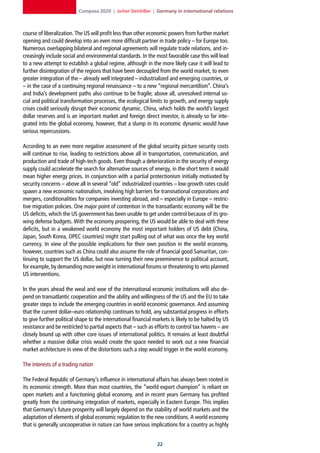
![Compass 2020 | Jochen Steinhilber | Germany in international relations
integrated as Germany. A creative foreign trade policy geared to cooperation and integration
will thus be one of Germany’s key tasks for the future.19
While it is true that Germany has an important voice in the global economy, the influence of
individual countries – excepting the US – on its architecture is very limited. The only promising
response to this weakness is further integration of Europe – internally, efforts to forge a strong
and dynamic economic bloc (for example, on the basis of a common competition policy or a
revitalization of the European macroeconomic dialogue), and externally with a view to assu-
ming a major role in multilateral forums in order to forge ahead with reform of international
institutions. The medium-term goal here must be a complete Europeanization of Germany’s
foreign trade policy.
While the international financial system has been spared a major crisis in recent years, the
systemic risks that have time and again destabilized international markets – currency specu-
lation and exchange-rate fluctuations, current account equilibria, or the growing role played
by difficult-to-control hedge funds and private equity firms – are still with us. The only way
to counter international financial markets’ current crisis tendencies is to put in place a strong,
transparent, and democratically legitimized international regulatory system, including both pri-
vate- and public-sector actors. Apart from making it possible to better control market actors,
such a regulatory system would also prove helpful in boosting market stability by renewing
debt-relief efforts for highly indebted countries (for example, by creating an international insol-
vency mechanism) and establishing controls on capital movements. The international oversight
authorities, above all the IMF, are in need of reform. Such reforms would include in particular a
redefinition of quotas and voting rights designed to increase the weight of the emerging coun-
tries and to improve crisis management. The prospects of such reform options depend chiefly
on whether and to what extent the most important international financial centers – in this case
mainly the US and the UK – would be prepared to contribute to stabilizing the system.
Germany’s export-based economy is necessarily interested in a long-term increase in world-
wide purchasing power and the integration of new markets. One aim of German foreign-trade
policy must therefore be to promote the development of – above all – its European neighbors,
but also of less developed world regions, with a view to creating new long-term market oppor-
tunities and using instruments of economic and development policy to stabilize markets (see
Section 5.5).
Germany’s trade orientation will continue to involve a number of obdurate goal conflicts in
foreign policy. As far as some of these conflicts are concerned – for example, arms exports
or trade in sensitive goods – greater efforts should be made to strengthen the credibility of
German policy (for example, in human rights and conflict prevention) than to service special
economic interests. Other goal conflicts that may have a major impact on society – for exa-
mple, efforts to restructure and open up the European agricultural market or, more generally,
ongoing social adaptation – will prove more difficult to master.
IV. 2 Population mat ters! Demography and migration
Two worlds
Population development forecasts are relatively stable. While it is difficult to predict the out-
break of war or crisis, and most of the technologies and the better part of the capital stock that
will be in use in 2050 have yet to be created, over 40% of the world population of 2050 has
already been born. The United Nations expects the world population in 2020 to be roughly 7.5
19] Michael Dauderstädt/Christian Kellermann, Controlling the risks of a global economy: Germany‘s role, Compass 2020,
Friedrich-Ebert-Stiftung, Berlin, 2007.
2](https://image.slidesharecdn.com/compass2010de-100605073420-phpapp01/85/Compass2010-de-25-320.jpg)
![Compass 2020 | Jochen Steinhilber | Germany in international relations
billion people and the equivalent figure for 2050 to be some 9.2 billion (2005: 6.5 billion); over
half of these people will live in Asia. While between 1950 and 2000 world population grew
by 142%, it is expected to grow only by 49% by 2050 – and then to stagnate at around that
level.20 The coming 40 years could thus bring the end of massive, global population expansion,
removing from the global agenda the problem of “overpopulation” in the sense discussed in
international relations in the course of the twentieth century.
But population and population development will continue to be crucial factors as far as interna-
tional relations and the global economy are concerned. The continuing – albeit slower – rise in
world population – which will, moreover, be regionally concentrated and go hand in hand with
other developments tending to aggravate the situation (urbanization, desertification, overfi-
shing, shortages of drinking water, massive proliferation of small arms) – will increase the pres-
sure on resource allocation, ecological systems, and social interaction. Regional developments
will differ from what we have been accustomed to. The bulk of population growth will occur
in the regions least equipped to cope with it economically, politically, environmentally, and
socially. Asia will continue to have the world’s largest population, but trends will differ from
region to region: while Pakistan and Bangladesh will face huge demographic pressure, China’s
overall population, though it will not decline, will experience quite abrupt shifts in its age struc-
ture: for example, in 2020 there will be over 400 million Chinese over the age of 65. The most
rapid population growth will be found in Sub-Saharan Africa, North Africa, and the Middle
East, which contain 16 of the 20 societies with the world’s highest birth rates. In the coming 20
years the population will continue to grow in central Africa in particular (68%), but also in West
and East Africa (52 and 55%), while the population of southern Africa will stagnate on account
of the AIDS pandemic. The Middle East will experience dramatic growth in the working-age
population (50% by 2025), and this will entail growing pressure on the region’s labor markets.
Of the nine countries that will account for some 50% of the increase in world population (India,
Pakistan, Nigeria, Democratic Republic of Congo, Bangladesh, Uganda, the US, Ethiopia, and
China) only one is a developed, industrialized country.
Various demographic risk factors that will appreciably raise the danger of internal conflict will
tend to coincide in many developing countries. In the coming ten years roughly one billion
new workers will enter the labor market, 95% of them in developing countries.21 Particular
attention should be paid here to the high percentages of 15- to 24-year-olds (“youth bulges”);
in some cases they account for up to 60% of the population and are often at massive risk of
unemployment. Encouraged by rapid urbanization, they are likely to prove a social challenge
and a serious instability factor (“angry young men”) precisely where economic opportunities
are rare and youth unemployment rates are high.22
In most developing countries, however, the population will decline, with the average age of
the population rising appreciably. In 2030 nearly one in four West Europeans will be over 65,
while in Sub-Saharan Africa the same age group will account for no more than 4%. The coun-
tries most affected by population decline will be Russia (some 10% by 2025) and the eastern
European countries, but also Japan. As far as western Europe is concerned, Italy, Germany, and
Spain will experience a slight decline in their population, while the UK and France are expected
to see their population rise in the coming 20 years. By 2020, however, Germany will not be tan-
gibly affected by demographic developments (population contraction), although it will feel the
anticipated shift in age composition, above all in its working-age population. Efforts to ensure
that a sufficient number of qualified workers are available will become even more difficult in
this period.
20] UNFPA, State of World Population 2007, New York, 2007; United Nations Population Division, World Population Prospects:
The 2004 Revision, New York, 2004.
21] Erfried Adam, Human rights and international social policy: Constraining the anarchy of power, Compass 2020,
Friedrich-Ebert-Stiftung, Berlin, 2007.
22] Countries with high population growth face a risk of civil conflict twice as high as that found elsewhere.
2](https://image.slidesharecdn.com/compass2010de-100605073420-phpapp01/85/Compass2010-de-26-320.jpg)
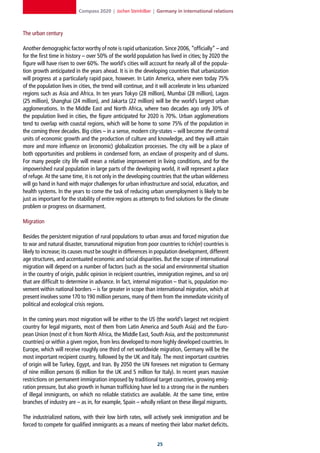
![Compass 2020 | Jochen Steinhilber | Germany in international relations
Countries such as Germany that traditionally have a large share of migrants and appropriate
migration structures are likely to find this easier than, for example, Japan, where the cultural
barriers are so high that they rule out any appreciable growth in immigration. For the deve-
loped countries, this situation may, in the short term, mean a better supply of labor, but it may
also lead to social tensions and cultural conflicts. An economic downturn in the EU would re-
duce migrants’ chances of integration, generating an increasingly protectionist public opinion,
but also xenophobia, and in the end attempts to actively attract immigrants might – in view,
say, of security threats – be drastically reduced.
In the countries of origin, in turn, emigration of skilled workers and specialists constitutes a
serious obstacle to development. The countries worst affected by this include African coun-
tries with a small reserve of skilled workers, such as Ghana, Nigeria, and Algeria. As regards
India, while 60% of the graduates of Indian technical colleges left the country in the 1990s,
in the meantime this has been compensated for by the large number of qualified workers the
country trains itself and the increasing trend toward outsourcing work to India. Despite some
successful efforts undertaken by prosperous emerging economies, such as Taiwan, this distri-
bution conflict is likely to grow in intensity in the coming years, fuelled by massive attempts by
the countries of the North to recruit new skilled labor.
Crossing boundaries
In the medium term there is little Germany can do to influence global population development.
The resources available should be used to implement the decisions taken at the Cairo Con-
ference on Population and Development (above all with regard to women’s rights and family
planning), and in working out development-policy priorities it would make sense to accord
more consideration to the structure of migration to western Europe.23
However, in the short to medium term the only viable approach to meeting the demand for
qualified workers must be a combination of managed immigration and improved integration
strategies. At the same time, a (partial) legalization of illegal migration, which has become a
fixed element of the European economies, could help to stifle human trafficking and defuse the
dangerous conditions under which migration takes place. A migration regime jointly worked
out by the European counties will have to define the criteria for immigration and clarify the
issue of family reunification, which accounts for a large share of immigration to the EU coun-
tries. A package of this kind would also include a debate on the relevance of and the need for
continuous immigration, a development for which Germany in particular is prepared neither in
political nor in social terms.
The developed countries’ grab for skilled workers, mostly from developing countries, to com-
pensate for their own (education-)policy deficits defines a further facet of global disequilib-
rium. The countries actively recruiting immigrants will have to deal with the compensation
issues involved, though it has become clear that the relevant measures will be difficult to
enforce: at present there is some talk of an exit tax to be paid to the country of origin by the
recruiting company.
In the coming decades the key issues in urban centers will be transportation systems, resource
processing, land management, social infrastructure, and innovative administrative structures.
German municipalities have much to offer in this connection. Closer cooperation in these fields
with dynamic urban regions, which are often the economic centers of continents, would also
benefit German cities and regions.
23] Ernst Hillebrand, Too many or too few? Demographic growth and international migration, Compass 2020,
Friedrich-Ebert-Stiftung, Berlin, 2007.
2](https://image.slidesharecdn.com/compass2010de-100605073420-phpapp01/85/Compass2010-de-28-320.jpg)
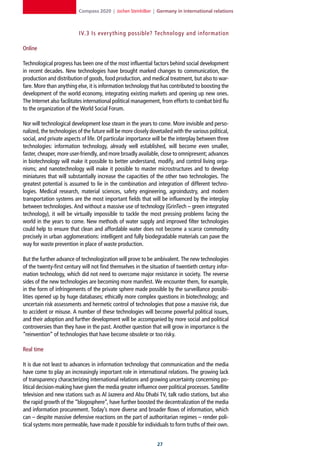
![Compass 2020 | Jochen Steinhilber | Germany in international relations
At the same time, today’s decentralized access to information and information dissemination
makes it easier for all kinds of political actors to launch campaigns, to persuade people, to pro-
pagate their views, and to organize: the Internet, a medium subject to very little censorship, is
crucial in this connection, and today the spectrum of interventions it has made possible range
from the Internet petition and the virtual “J’accuse” to the downloadable terrorist video.
Television has in recent times clearly demonstrated the huge influence that (staged) picture
worlds may have on our worldviews. In the second Gulf war, real time, live transmissions,
pool journalism, and new military technology set the stage for a strategic occupation of our
screens, a strategy that was supposed to show us a germ-free and victimless war; this strategy,
however, proved impracticable in the third Gulf war thanks to the decentralization of informa-
tion and altered attitudes on the part of many in the media. Richly illustrated information can
create a “morality of perception” (Georg Seeßlen) that calls on us to act, while the opposite
“CNN effect” may lead to situations in which world events, no longer reported on, find little
attention – and induce little political action. The discussion on the “image-defining role of the
media” and the enlightening, distorting, or formative role played by the media in internati-
onal relations shows, finally, that public opinion has become a weighty factor in international
politics – and the question of how and through what media international politics can best be
influenced is bound to grow in importance.
Offline
Modern communication technologies such as the Internet awakened hopes of a “great equa-
lizer” that was to be used to transfer knowledge and information throughout the world. In fact,
global inequality has turned out to have another facet: a virtual wall separates the countries
that have at their disposal as much information and communication technology as they desire
from the countries that have limited access to this technology. While the digital divide finds real
expression in other categories as well (rural/urban, income, gender, education, age), the most
striking global inequalities are geographic: by far the greater part of mankind remains cut off
from modern information and communication technologies. Some 90% of Internet users live
in the industrialized countries; over half of the world’s population lacks access to a telephone,
while 19 out of 20 have no Internet access. While the US and Canada (69.7%), followed by
Europe (38.9%), have the highest degree of market penetration (Internet users/population), the
Middle East (10%) and Sub-Saharan Africa (3.6%) have the least.24 The entire African continent
(minus South Africa) has less Internet traffic than Manhattan. Asia shows a number of major
disparities: while China, with 137,000,000 users, has the largest and fastest-growing Internet
community and the Tigers and Japan have high degrees of penetration, parts of South Asia and
– in particular – the Central Asian republics (with an average of 2.3%) have largely been left
behind. In Latin America (17.3%) the Cono Sur countries, led by Chile and Argentina, are better
connected than the Andean countries or Central America.
There is reason to believe that in the coming years the development divide between the “have
nets” and the “have nots” will continue to deepen. And the parts of the world that already
have technologies and continue to develop them will do all they can to improve their connecti-
vity. Some countries in Asia will be better connected, as will parts of Latin America – above all
Brazil, where over 20 billion euros has been invested in telecommunications projects in recent
years, while no more than two billion euros has been invested in the Middle East, South Asia,
and Sub-Saharan Africa.25 The disconnected world will experience the emergence of islands of
information and communication, where mainly social elites and NGOs will be connected.
Today, the ability to make use of information technology is one of the factors crucial for prospe-
24] Internet World Stats, www.internetworldstats.com/stats.htm, 26 March 2007.
25] UNESCO, World Report: Towards Knowledge Societies, Paris, 2005; Social Watch, Report 2006: Impossible Architecture, Paris, 2006.
2](https://image.slidesharecdn.com/compass2010de-100605073420-phpapp01/85/Compass2010-de-30-320.jpg)
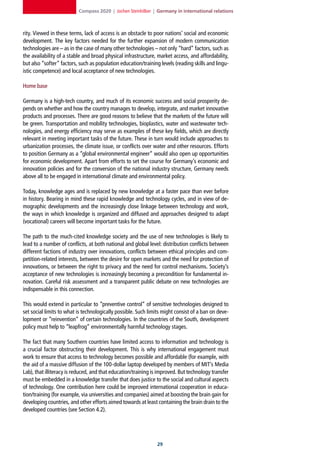
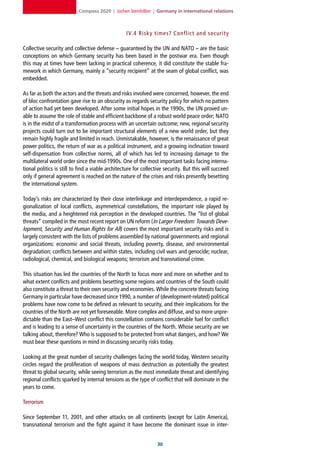
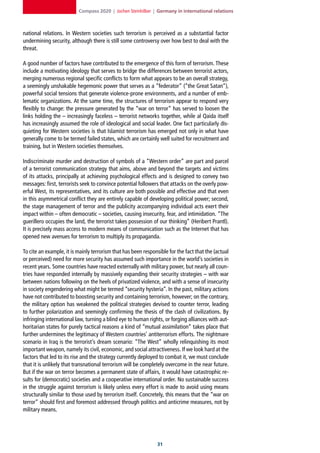
![Compass 2020 | Jochen Steinhilber | Germany in international relations
Disarmament and proliferation
All Western security doctrines regard the proliferation of weapons of mass destruction as
one of the most important threats to global security. Issues of disarmament and arms control
agreements have not ranked high on the agenda in recent years, however. The opportunity
presented when the East–West conflict came to an end to accelerate the reduction of arms
stockpiles, to establish a new disarmament and arms control regime, and so possibly to pre-
vent the emergence of new nuclear powers, has not been taken. And despite the undisputed
successes of, for example, a regime such as the Nonproliferation Treaty, the existing regimes
are in danger and are coming under growing pressure from various quarters.
At present, for instance, we can observe a clear-cut trend toward the further proliferation and
modernization of nuclear weapons, a development that could trigger a “spiral of fear”. Pa-
kistan, India, and (presumably) North Korea have already become nuclear powers, and Israel
is also reported to be in possession of nuclear warheads. Iran is working full speed ahead on a
nuclear program that, according to the IAEA’s assessment, is also designed for military use. It
is above all in sensitive regions such as East Asia and the Middle East that some other countries
(for example, Japan, Egypt, and Saudi Arabia) might come to regard the acquisition of nuclear
weapons as a viable security option. Enlargement of the circle of nuclear states would not
only make the work of arms control far more difficult, but it would also – as the examples of
Pakistan and North Korea show – increase the risk of proliferation between countries. What we
see is a growing risk that a “nuclear supermarket” may develop that could, potentially, facili-
tate the access of terrorist actors to weapons-grade material. The old nuclear states in turn are
currently modernizing their arsenals, demonstrating their intention to continue defending their
privileged interests and their unwillingness to rid themselves of their nuclear weapons. At the
same time, these countries are distancing themselves from the exclusively “political” role that
nuclear weapons played in the past by developing tactical nuclear weapons designed explicitly
for use (“mini-nukes”).
While there is no mistaking an incipient nuclear arms spiral that could unleash a dangerous
dynamic in the coming years, we can at the same time note a decline in the number of coun-
tries producing chemical or biological weapons – a development due not least to the Biolo-
gical and Toxin Weapons Convention. The focus now is more on non-state actors. While at
present nuclear weapons are too costly to build without the aid of state structures (unless of
course relevant groups gain the support of certain states), the rapid further development and
dissemination of biotech research has given rise to a real danger that terrorists could acquire
biological weapons, which are easier to build or procure. One of the central questions will be
how successful regimes can best be modified and adapted with a view to effectively preventing
non-state actors from building or acquiring such weapons.
At present there are no binding and efficient regimes in place to control small arms, the most
devastating type of weapon in use in ongoing conflicts: today some 90% of all victims of con-
flict are killed by small arms, some 650 million such weapons are in circulation, half of them
privately owned, and a good share of them – facilitated by organized crime26 – wandering from
crisis region to crisis region. Cheap, easy to transport and conceal, and simple to operate, small
arms are the “perfect” weapon for the “new wars” (Mary Kaldor). The 2001 UN Programme of
Action to Prevent, Combat and Eradicate the Illicit Trade in Small Arms and Light Weapons in
All Its Aspects has been the point of departure for numerous initiatives, most of them launched
by civil society organizations. While the program contains a number of recommendations for
action (such as identification and destruction of surplus publicly owned weapons) the control
regimes continue to be weak. It is above all the resistance of the major producers (the US
26] Richard Mörbel/Sönke Schmidt, Prevention and suppression of organised crime: future action perspectives from a German and a European
angle, Compass 2020, Friedrich-Ebert-Stiftung, Berlin, 2007.
2](https://image.slidesharecdn.com/compass2010de-100605073420-phpapp01/85/Compass2010-de-34-320.jpg)
![Compass 2020 | Jochen Steinhilber | Germany in international relations
and Russia) that has so far managed to prevent the inclusion of privately owned weapons,
the setting of binding standards – that is, that give due consideration to the conflict risk in
recipient countries – for weapons transfers, and the adoption of rules barring non-state actors
as recipients. Despite EU pressure, the Small Arms Review Conference held as a follow-up on
the Programme of Action 2006 was unable to come up with any new agreements. In view of
the situation of violence in many countries, this void represents a serious problem for crisis
prevention.
Fragile states – fragile regions
According to estimates, today some two billion people live in fragile states, although it must
be said that the range of states included here extends from weak states with deficits in indivi-
dual areas to countries embroiled in civil war and collapsed states that have lost control over
their own territory. The process of state failure as a rule takes a fair while to reach the stage of
complete collapse. Fragile states usually have serious deficits in maintaining basic government
functions, including the enforcement of the state monopoly on the legitimate use of force,
lawmaking, taxation, or social services. Many factors play a role when a country develops into
a failed state, and the impacts of these factors may differ considerably from one country to
another. Two can be traced like a red thread through all the “failure stories”, however: social in-
equality and a state that has fallen into discredit are foremost among the causes of instability.
Under the crumbling shell of the nation-state, we find structures that, far from serving to create
stability, operate as causes for conflict. Autocratic rule and neopatrimonial political systems,
often accompanied by systematic corruption, are factors that discredit state institutions. This
lack of robust statehood and of elites oriented to the public good in turn serves to strengthen
other substate structures: while “civic” loyalty tends to weaken in “shadow states”, ethnic and
religious ties tend to strengthen as clans and local autocrats begin to exercise social control.
Transformation of the form of belligerent conflict is usually traced back to the “crisis of state-
hood”. The dissolution of the state monopoly on the legitimate use of force, a weak instituti-
onal landscape, and a lack of legitimacy in the eyes of society are generally seen as the most
important preconditions for or as concomitants of an escalation of violent conflict. As Herbert
Münkler noted, in many regions the “state-building wars” familiar from the era of decoloni-
zation are now being superseded by “wars of state collapse”. The most manifest expression
of such regional conflict formations may be seen in the so-called “new wars” (Mary Kaldor).
These conflicts, 90% of which are fought in regions of the South, are marked by a large degree
of diffusion, irregularity, and asymmetry. All of the demarcation lines drawn – mostly based
on Clausewitz’s ideas – to characterize war in the classic sense (for example, between govern-
ment, army, and population, between combatants and civilians, national and foreign territory,
between politics and the economy) have tended to become blurred. These conflicts do not
center primarily on efforts to capture government power, but are dominated by other objec-
tives such as identity politics or appropriation of (local) sources of wealth, energy resources,
and so on. The war economies thus created serve to fund hostilities, although they themselves
may become a source of conflict. Here the only function of statehood seems to be to block the
access of regional warlords to the world market, assuming they are able to turn world market
access to account, for example, in the form of diamonds, opiates, timber, or human beings.
One effect of the informalization of such conflicts is that they are seldom terminated by agree-
ments between the conflicting parties, tending more simply to weaken or to run out of steam
over the course of time – although they may also flare up again at any time. Half the pacified
countries of this kind experience, on average, the outbreak of a new conflict within less than
five years.27 One especially problematic phase tends to occur roughly three years after a peace
accord has been signed, when the attention of world public opinion and the international do-
27] David Harland, Die Aufmerksamkeit für Konflikte hält nicht lange an, Interview mit dem Leiter der “Best Practices”-Einheit in der Hauptab-
teilung der Vereinten Nationen, in: Aus Politik und Zeitgeschichte, No. 41, 2005.](https://image.slidesharecdn.com/compass2010de-100605073420-phpapp01/85/Compass2010-de-35-320.jpg)
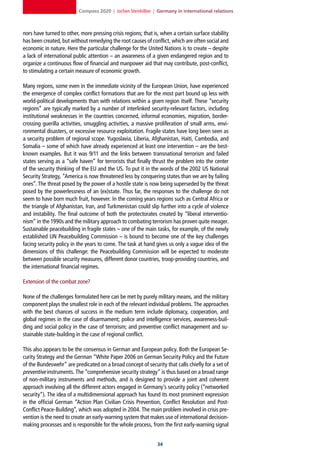
![Compass 2020 | Jochen Steinhilber | Germany in international relations
to the formulation and implementation of a prevention strategy. One particularly problematic
aspect here is the gap between early warning and preventive action; its causes may be sought,
on the one hand, in the at times somewhat impractical analyses formulated by “early warners”
and, on the other, in the lack of political will on the part of decision-makers.
But the actual practice of Germany’s security policy stands in contrast to its constantly refor-
mulated basic concerns: above and beyond cooperation in individual cases, an overall concep-
tion has yet to be worked out for networked security. The Action Plan has had little more than
a symbolic effect, and the idea of prevention has not found concrete expression in either the
funding provided for the relevant instruments or in a strategy. The existence of this strategic
gap entails the danger that, given these conditions, an extended security concept can lead
only to an extended defense concept that blurs the boundaries of situations in which defense
becomes necessary, expanding the Bundeswehr’s tasks (at home and abroad), but without
strengthening the civil instruments involved. Even today, when the Bundeswehr is sent on mis-
sions abroad, it is assigned, for example, police tasks, namely functions for which it is actually
not responsible and that constitute a growing burden on it, in both personnel and funding
terms. But a security-policy alternative designed to actively represent European interests ab-
road would require timely efforts to enlarge the civil components involved.
At the United Nations level, the concept of the “Responsibility to Protect” (R2P) was formu-
lated in response both to alarming developments in some crisis regions and to the question of
the conditions under which external actors may legitimately intervene to protect the civilian
population: if a state is unwilling or unable to protect the population against genocide, war
crimes, ethnic cleansing, and crimes against humanity, the responsibility to protect devolves
upon the other members of the international community. And in view of the fact that (military)
intervention is seen as the means of last resort to put an end to a conflict, early warning has
an important role in this connection. At the UN level, the appointment of Francis Deng by
Secretary-General Ban Ki Moon in May 2007 to the new position of Special Advisor for the
Prevention of Genocide has upgraded this office, giving the R2P concept real relevance (as
opposed to the rhetorical relevance it had previously). While the German government’s Action
Plan also contains a commitment to the R2P concept, this has yet to be fleshed out in concrete,
substantive policy terms.
Another question that needs to be addressed in connection with this still unresolved task is
how, in the years ahead, German politics will deal with missions abroad involving German
soldiers. Despite the over 10,000 German solders presently on missions in crisis regions throug-
hout the world, a fundamental political and social debate on the aim and object of German
missions abroad has been slow to develop; there is a tendency in Germany to “smuggle”28 such
missions past the eyes of the citizenry by seeking to minimize the scope of the risks involved,
playing down their military character, and often not clearly specifying their aims and perspec-
tives. The fact that hardly any public notice has been taken of the projected extension of the
Afghanistan mandate is perceived with growing unease by the Bundeswehr. Instead of seeking
to “conceal” military missions, it would be important to increase efforts to cast such missions
in a political light and to engage in a public discussion on the decision-making process.
In this connection more and more calls have been heard for Germany to use a list of con-
crete criteria to formulate “more clearly” the point of a given mission and the mission area
concerned. A debate of this kind could certainly contribute to improving the transparency of
decisions and provide some points of orientation on missions abroad, but the result should not
be a simple “checklist” with a bottom line indicating clear-cut pros and cons. In the years to
come individual missions will need to be decided on a case-by-case basis, and here the German
Parliament should take a more assertive stance than it has in the past. Nor should the discus-
28] Ulrich Speck, Kosmoblog, Die Zeit, http://blog.zeit.de/kosmoblog/?cat=26, 17 July 2007.](https://image.slidesharecdn.com/compass2010de-100605073420-phpapp01/85/Compass2010-de-37-320.jpg)
![Compass 2020 | Jochen Steinhilber | Germany in international relations
sion be keyed to “national interests”, which have been postulated again and again, but for the
most part without a clear definition: while these interests may be bound up with the need to
secure natural resources, they should be clearly oriented to the protection needs of the affected
populations and based on rules that have been jointly agreed on. The five criteria used to exa-
mine the use of military means (seriousness of the threat, purpose of the intervention, ultimate
means, appropriateness, consequences – they also went into the making of the final document
of the 2005 UN Summit) could prove useful in better structuring the debate. But here too it is
important to bear in mind that those who ask for criteria for missions abroad should start out
by asking about crisis prevention. And as far as the White Paper 2006 is concerned, it would
be essential to clarify the concrete structures in which an international security engagement
is embedded, mindful of the fact that this may, in extreme cases, mean military intervention.
These missions should be integrated in a system of collective peacekeeping in the UN frame-
work, and the contributions of regional structures must be closely dovetailed and coordinated
with the corresponding UN structures.
Looking at the various fields of foreign policy from the German perspective, the greatest
change thus far has undoubtedly taken place in security policy. But strategic debate on the
consequences, instruments, and aims of German security policy has made little headway in re-
cent years. The White Paper 2006 did little to change this situation. A commission of inquiry on
“networked security”, including representatives of politics and civil society, the Bundeswehr,
security experts, and partners from abroad, could provide an impetus for a broader debate in
society. The commission could be asked to conclude by issuing a brief, concisely formulated
strategy paper – one conceived not as the end of the debate but as the point of departure for
further debates. Security policy in particular must maintain a certain measure of flexibility in
order to be able to respond appropriately to crisis situations, although it must at the same time
be built on a foundation of predictability and reliability.
In Germany there is a fundamental consensus that prevention – a reasonable, effective, and
lower-cost approach to managing conflicts with major escalation potential – must be given
precedence over intervention, an after-the-fact response to war, genocide, or state failure.
This must be given a clearer expression than it has in the past in terms of how the existing
instruments are embedded in a security strategy, as well as in the expansion of funding and
the coordination of the strategy.29 It will be possible here to fall back on the preliminary work
carried out by several international NGOs active in the field of early warning/early diagnosis.
It would therefore make sense to build consistently on the first steps taken on the road to
interministerial cooperation, for example, within the framework of the Action Plan. First stu-
dies on the Action Plan three years after it was adopted have come to the conclusion that no
forward-looking developments have yet become visible – either in efforts to systematically
network existing early-warning instruments or in approaches to collating crisis-relevant data
with non-state institutions.30
Networked security calls for networked governance. With a view, among other things, to not
overextending its capacities, Germany should take advantage of the parallel development of
the European Security and Defence Policy (ESDP) and the process of coordination with the
other member states to concentrate especially on those areas in which it has particular exper-
tise, for example, promotion of democracy.31
In the fields of disarmament and arms control policy Germany has in the past earned interna-
29] Michèle Auga, Crises and wars in times of globalization: How German crisis prevention and peace building could help, Compass 2020, Fried-
rich-Ebert-Stiftung, Berlin, 2007.
30] Christoph Weller, Zivile Krisenprävention und Konfliktbearbeitung: Politische Herausforderungen und der Aktionsplan der Bundesregierung,
http://inef.uni-due.de/page/documents/Weller_-_Zivile_Krisenpraevention.pdf, 16 Oct. 2007.
31] Stefanie Flechtner, On a new mission: the foreign mission of the Bundeswehr and German security policy, Compass 2020, Friedrich-Ebert-
Stiftung, Berlin, 2007.](https://image.slidesharecdn.com/compass2010de-100605073420-phpapp01/85/Compass2010-de-38-320.jpg)
![Compass 2020 | Jochen Steinhilber | Germany in international relations
tional recognition that should be turned to account in the years to come. A strict arms export
control policy, a multilateral, preventive arms control strategy, and efforts to preserve the non-
proliferation regime would be among the central points of departure here. This would also
mean taking a clear position against the modernization of nuclear arsenals and for efforts to
swiftly reduce stockpiles – also in Germany.32
Since one of the aims of terrorism is to manipulate political thinking and action in target coun-
tries, the domestic approach selected for dealing with the threat is of crucial importance for
thwarting terror. Without exception, the balance between security and freedom will ultimately
be based on consensus in society. Thus far most countries have responded to the threat by
restricting civil rights and liberties, adopting more refined methods of data collection and sur-
veillance, and curtailing constitutional rights in favor of preventive and seemingly tougher and
more effective emergency laws. Instead of continuing to overburden and fetishize the concept
of security, it would be far more reasonable to develop a kind of political countercommunica-
tion that places its trust precisely in civil liberties and provides information and education as a
means of helping the societies concerned to develop a civil and pragmatic approach to dealing
with the threat.
IV.5 The last oil change?
While for years it could be taken for granted that energy would simply flow from the power
socket, the water heater, and the furnace, in the winter of 2006 the current stock of uncertain-
ties was supplemented by the fear that Germans and other Europeans might soon be sitting in
unheated houses, staring into cold cooking pots if Russia turned off the gas supply. More than
almost any other policy field, energy has in recent months been thrust into the consciousness
of politics and the general public. While energy policy had vanished from the political agenda
since the two 1970s oil crises, high oil prices, the climate debate, rising demand for energy
in the emerging markets, and the political instrumentalization of energy resources have now
sparked a debate on energy security. The energy issue is closely bound up with other core
foreign-policy issues: without a secure, smooth, and affordable supply of energy, economic
development is unthinkable – access to energy is an elementary component of global equity;
successes in climate policy are contingent, among other things, on energy efficiency, availabi-
lity, and consumption; renewable energies can be developed only on the basis of technological
innovation; and, finally, the political stability of importing and exporting regions alike will
depend in key ways on how energy policy is formulated in the future.
Scarce resources
Worldwide demand for energy is expected to rise by some 50% by 2030, and 81% of this de-
mand will continue to be met by fossil fuels. Primarily on account of the transportation sector,
oil (33%) will remain the most important energy resource, and by 2020 natural gas will have
toppled coal from second place. Forecasts indicate that the contribution of nuclear energy will
decline from 6.5% today to around 5%. Renewable energies will account for 8%, with hydro-
power contributing the largest share; biomass will continue to grow in importance, especially
for the fuel sector; and solar and wind energy are expected to post the highest growth rates.
Wood, finally, continues to satisfy some 6% of worldwide demand for energy. But these figures
conceal some different, in part conflicting, regional trends. The developing and emerging coun-
tries, above all China and India, will account for over two thirds of rising demand. By 2020,
however, consumption of fossil energies – except for coal – and use of nuclear power will be
appreciably higher in the developed than in the developing and emerging countries. While the
share of nuclear energy will increase in Asia, in Europe it is likely to decline on account of public
32] Hans J. Gießmann, Farewell to disarmament? Points of orientation in Germany‘s arms control policy, Compass 2020,
Friedrich-Ebert-Stiftung, Berlin, 2007.](https://image.slidesharecdn.com/compass2010de-100605073420-phpapp01/85/Compass2010-de-39-320.jpg)
![Compass 2020 | Jochen Steinhilber | Germany in international relations
reservations concerning the risks it poses. But the highly heterogeneous character of European
nuclear strategies and the link with the climate debate could also lead to a situation in which
nuclear energy experiences a renaissance by 2020. The most recent medium-term energy con-
cepts formulated by the US and the EU indicate that agrofuels will be able to replace a certain
share of fossil energy resources, above all in the transportation sectors of the developed coun-
tries, but also in Brazil and India. While capacities for the use of water power are practically
exhausted in the developed countries, China, but also India and Latin America are likely to
expand their capacities massively.
Although there has been some media talk of the possibility of “oil wars”, the macropicture
anticipated for the medium term is not solely gloomy. Europe is unlikely to experience any
protracted bottlenecks in its energy supply by 2020 – unless unanticipated, massive energy-
related conflicts should develop. According to conservative estimates, the world’s proven oil
reserves will last for some 50 years. The much-discussed peak, however – that is, the point at
which oil production begins to decline rapidly – is anticipated somewhere between 2015 and
2025. In other words, time is growing short to embark on a new energy policy course, and
there is no disputing the fact that energy resources are increasingly scarce.
The era of cheap oil likewise appears to be over, and the markets are likely to remain nervous.
Growing demand, possible cuts in oil output due to lack of investment, but also to financial
speculation in the oil market, are likely to keep prices high and volatile. In the coming years
this – together with access barriers to regional energy systems – could lead to serious supply
problems for a number of developing countries, for which oil is a particularly important cost
factor. Twenty-five of the world’s poorest countries are forced to import 100% of the oil they
consume.
The combination of rising demand and declining oil production in the most important oil-con-
suming regions is leading to a growing dependence on energy imports. This development puts
the emerging countries and the developing countries in the same boat, and it is bound to give
rise to major political problems, on top of the technical challenges involved (for example, trans-
portation). In the coming two decades Europe will have to import some 90% of its oil (most of
it from Saudi Arabia, Iran, Iraq, Algeria, Russia, and Norway) and 80% of its gas (from Russia,
Norway, and Algeria, as well as from Qatar in the future). The US, which, unlike the other main
importers, has appreciable oil and gas reserves of its own, will be forced to use imports to meet
some 20% of its gas needs and 66% of its oil needs. But the US already has a highly diversified
oil import structure, with its imports breaking down as follows: 33% from Latin America, 23%
from the Middle East, 18% from Africa, and 16% from Canada. Coal, which covers roughly two
thirds of China’s energy needs, will continue to play the main role in the country’s energy mix,
although in the coming years the share of oil (and natural gas) will continue to rise because of
China’s growing transportation volume, expansion of its oil-processing industries, and envi-
ronment-related restrictions on the use of coal. Even today China is the world’s second largest
oil consumer, after the US. China, which 15 years ago could satisfy its demand for oil from its
own resources, will be forced to import some 80% by 2030. By 2020 India, which presently
imports two thirds of its oil from Saudi Arabia, Kuwait, Iran, and Nigeria, will be forced to
import roughly 90%.33
Since many countries will be virtually unable to compensate for these leaps in demand by uti-
lizing domestic resources or improving the efficiency of their energy production and consump-
tion, import structure diversification would be one possibility for them to at least mitigate their
dependence on imported energy resources. But the geographic concentration of the most im-
portant fossil energies – oil and gas – sets limits to any such strategy. If, until the 1950s, some
33] Jochen Steinhilber, China – A new actor in the Middle East and North Africa Region? Dialogue on Globalization,
Friedrich-Ebert-Stiftung, Berlin, 2006.](https://image.slidesharecdn.com/compass2010de-100605073420-phpapp01/85/Compass2010-de-40-320.jpg)
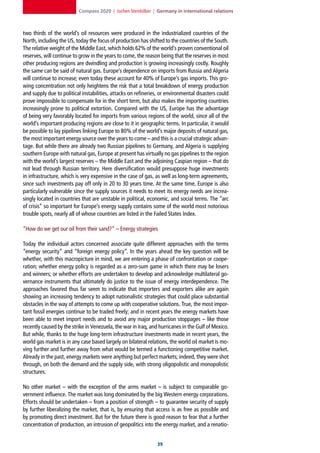
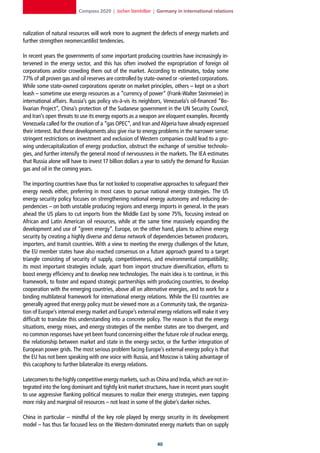
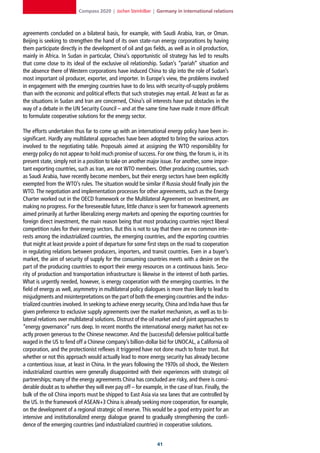
![Compass 2020 | Jochen Steinhilber | Germany in international relations
Facilitation
Looking to its security of supply, Europe would be well advised to diversify its import structure
as a means of improving the supply market; to build up strategic gas reserves to cover short-
term crises; to foster and expand strategic partnerships with important producing countries;
to provide impulses to work out a broadly accepted multilateral framework for energy policy;
to use technological innovations to improve energy efficiency; and to advance the use of new
sources of energy.34
The link between the climate debate and the energy issue is one reason to fear that the de-
cision to phase out nuclear energy will be increasingly challenged. Here it would be essential
to take a completely unambiguous position. Far from solving future energy problems, nuclear
energy is bound to create new ones. Uranium itself is a scarce resource, the technology creates
substantial security problems (protection against attacks, proliferation), thus far no permanent
disposal sites have been found that are at once technically robust and acceptable to society,
and, finally, nuclear energy is part and parcel of the old “command and control markets” and
therefore not competitive.
In Germany energy policy is regarded above all as supply(-side) policy. In the future it will be
increasingly important to gear energy policy less to the small number of suppliers than to the
large number of consumers concerned. Attempts to manage demand should focus on both
energy security (reduction of imports) and the international climate targets. Efforts need to be
redoubled in the future to exploit the resource of “efficiency”, and this means above all a need
for technological innovations (for example, in the transportation sector), legislative measures
(for example, designed to promote heat insulation of buildings or to improve automobile fuel
mileage), and information and education (for example, labels, so-called energy passports, and
so on).
What is most needed on the supply side is efforts to reduce marked dependencies in gas
imports: seven EU countries import 100% of their gas from Russia. This, however, would call
for major investments (for example, in infrastructure for liquefied gas transport), flanking po-
litical energy-security measures (for example, the Nabucco pipeline project from Central Asia
to Europe), and a common European policy toward Russia. Many of the goals formulated in
energy strategies will come to nothing if individual countries continue to foster their special
relationships with Russia, while others, with an eye to their neighbor to the east, are calling for
an “energy NATO”. Instead of further enlarging national energy policies, what will be essential
for Europe’s energy security in the coming years is that the member states take steps to transfer
responsibilities for energy policy to the European level.
As regards the emerging countries, it would be important to seek to open the International
Energy Agency to non-OECD members. This might start out with some first projects, for ex-
ample, efforts to build joint strategic reserves as well as a dialogue on energy efficiency and
alternative technologies. Confidence-building measures should include an unambiguous US
commitment to keep the international sea lanes open, a strict laissez-faire approach when it
comes to bids for oil licenses in Iraq, efforts to promote, instead of prevent, joint ventures with
the emerging countries in the energy sector, technology transfers in the field of renewable
energies, and a generally more sober sense of proportion as regards the effects of the Asian
countries’ engagement in the energy sector.
34] Dietmar Dirmoser, Energy security: New shortages, the revival of resource nationalism and the outlook for multilateral approaches, Compass
2020, Friedrich-Ebert-Stiftung, Berlin, 2007.
2](https://image.slidesharecdn.com/compass2010de-100605073420-phpapp01/85/Compass2010-de-44-320.jpg)
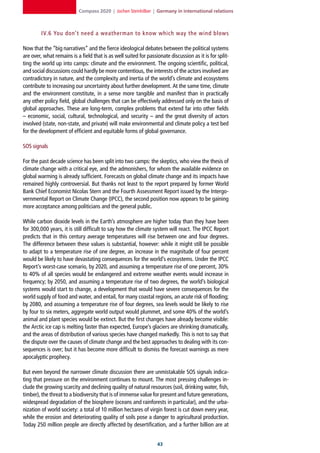
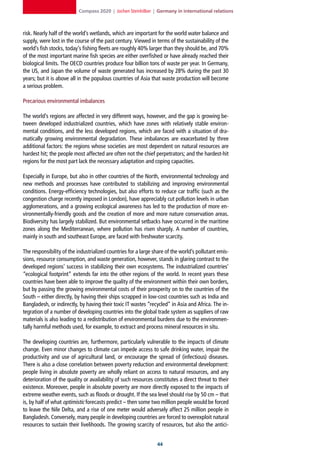
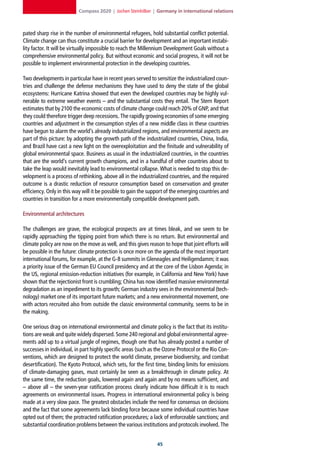
![Compass 2020 | Jochen Steinhilber | Germany in international relations
parallel existence of numerous protocols and conventions, bilateral standards, and corporate
responsibility pacts and declarations reflects both the diversity of interests and issues involved
and the weakness of global climate and environmental policy. The fragmented international
institutions – including, for example, the United Nations Environment Programme – which
could potentially serve as a peg on which to hang the highly diverse set of environmental
agreements, lack sufficient resources, are ineffective when it comes to decision-making proce-
dures, usually lack powers of their own, are weak on implementation and poorly coordinated.
In the field of environmental and climate policy there is no regulatory institutional framework
of the kind provided for by the WTO or the IMF and the World Bank.
Proposals for a future global environmental architecture are not lacking, however: in the late
1990s France came out – albeit unsuccessfully – in favor of a global environmental organization
that would serve to integrate the great number of existing environmental agreements. The ad-
vantage of a central institution would be that it would be in a position to assert itself vis-à-vis
the other powerful global institutions, to improve the coordination and coherence of programs,
and generally to give more weight to the implementation of environmental agreements. But
critics have objected that the complexity of the issues and actors involved in environmental
policy speaks less for a centralized solutions than for the creation of flexible alliances and envi-
ronmental clusters – although these would at the same time need to be better coordinated.
There is also reason to doubt whether the proposed new global environmental organization
would in fact be able to remedy the problems posed by insufficient resources, lack of political
will, and a need for further integration. Instead of creating new structures, the aim of other
proposals is therefore to implement environmental agreements more effectively, to improve
the quality and effectiveness of existing institutions, and to “mainstream” environmental
policy. This would imply a need to integrate more environmental expertise into the existing
development, trade, and financial institutions – in particular the World Bank; in their project
agreements the multilateral banks, the IMF, and the WTO would have to give more space to
environmental aspects, and national governments would be expected to make environmental
compatibility a key criterion of, for example, their development policies.
Scenarios on the future development of climate and environmental policy indicate that one cru-
cial element is the need to establish strong institutions with a view to leading the world on to a
sustainable climate course. Whether this succeeds will depend mainly on the shape given in the
coming years to the relationship between industrial, developing, and emerging countries, as
well as between the state, market actors, and society. One of the reasons why environmental
and climate policy will become a test case for global governance is that while in the years to
come there is likely to be a need for quick, effective, and global action, policy needs staying
power to bridge the time difference between action and visible effect.
More than hot air …
In the coming years Germany could play an important role in international environmental and
climate policy: its multilateral orientation, the presence of German representatives in top po-
sitions in environmental organizations, a solid environmental balance, the fact that the UN
Climate Secretariat is headquartered in Bonn, its innovations in environmental technology, and
its generally environmentally aware and interested population all mean that Germany has the
conditions needed to establish – also at home – “foreign environmental policy” as a central
policy field.35
The fundamental precondition here would be further successes in attaining a positive environ-
35] Herrmann E. Ott, International climate policy 2020: A challenge for German (environmental) foreign policy, Compass 2020,
Friedrich-Ebert-Stiftung, Berlin, 2007.](https://image.slidesharecdn.com/compass2010de-100605073420-phpapp01/85/Compass2010-de-48-320.jpg)
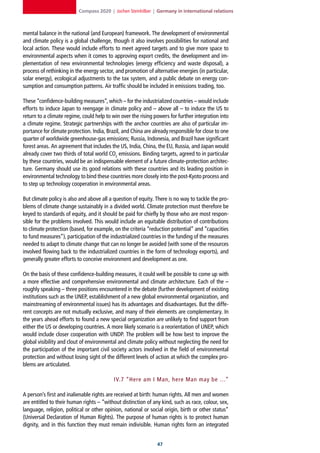
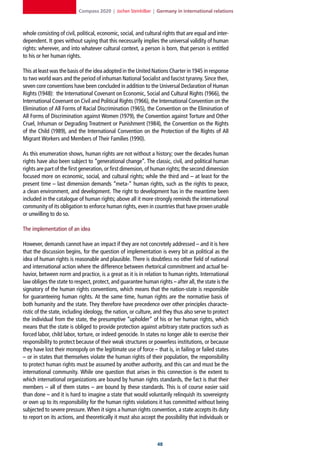
![Compass 2020 | Jochen Steinhilber | Germany in international relations
other states may initiate proceedings against it; but the United Nations is unable to enforce
compliance – unless it invokes Chapter VII of the UN Charter, which has been used rarely to
impose economic sanctions and even more rarely to impose military sanctions or to order a
so-called “humanitarian intervention”.
One other aspect that needs to be viewed in connection with humanitarian interventions is
the recent development of efforts to establish international relations on a legal basis, which
would include the establishment, in 2002, of the International Criminal Court (ICC), as well as
former ad hoc tribunals such as those appointed for Rwanda and the former Yugoslavia. As
important as these unique international legal institutions are for the development of human
rights, the refusal of the US to ratify the ICC’s Rome Statute is a clear sign of their limited scope.
If Chapter VII is not invoked, the only means left is for the United Nations or the numerous
nongovernmental organizations active in the field of human rights to “blame and shame” an
offending state.
Today the question of the – at least potentially – antagonistic nature of some principles of
international law (state sovereignty, the ban on the threat or use of force, and the protection
of human rights) is more topical than ever. In response to the 9/11 terror attacks the protection
of human rights have been pushed into the background in favor of efforts to protect national
security. In this connection particular consideration has been accorded to the US high-security
prison in Guantánamo, where the US is holding several hundred terrorism suspects without
regard to the rule of law, as well as to the interrogation methods used by the CIA, which has
at least tolerated the use of torture and mistreatment. In July 2007 the latter practice occasi-
oned the US President to ban the use of torture during interrogations of terror suspects and
to declare, five years into the war in Afghanistan, that the US would respect the provisions of
the Third Geneva Convention. In Germany, too, on the occasion of a case of child abduction in
2002, there was a controversial discussion over whether the police were justified in threatening
to use force, or more precisely, to use torture, to induce a suspect to testify against his will,
provided this would have prevented the child’s death. The fact that even in established demo-
cracies it is – as noted above – possible to discuss the status of, or perhaps even to violate,
human rights, which enjoy absolute protection even in times of emergency, illustrates the need
for a more focused and consistent approach to human rights.
The reality of a norm
It is easy to say that human rights are indivisible; but whether this implies, for example, that
social rights may not be enforced at the expense of freedom, and vice versa, or that women’s
rights may not be diluted in a strongly male-dominated society, or that the right to the free
exercise of religion may not be relaxed in non-secular countries is increasingly becoming a po-
litical question, and thus the subject of constant discussions among the UN member states. In
any case, the 1993 Vienna Declaration, signed by 171 countries, states in Article 5: “All human
rights are universal, indivisible and interdependent and interrelated”.36
Implementation of this provision seems to be more difficult when it comes to the right to
decent working conditions, however. Here it less the world of states than its business enter-
prises that are obliged to respect and guarantee the rights of the people they employ, and
so to prevent, for example, child labor and forced labor as well as other “modern” forms of
slavery. There is no international body that could induce companies to enforce decent working
conditions in the failing or failed states referred to above, which are unable to apply whatever
national labor laws they may have, or in countries that fail to enforce the so-called Core Labor
Standards. Here international law runs up against its limits, for it is only states – the exclusive
subjects of international law – not business enterprises, that can be held accountable in such
36] www.unhchr.ch/huridocda/huridoca.nsf/(Symbol)/A.CONF.157.23.En, 17 July 2007.](https://image.slidesharecdn.com/compass2010de-100605073420-phpapp01/85/Compass2010-de-51-320.jpg)
![Compass 2020 | Jochen Steinhilber | Germany in international relations
cases. And while the so-called Global Compact – an agreement reached in 1999 between
the United Nations, civil society, and business enterprises – takes up this problem complex,
with its members declaring, with their signatures, their willingness to work for compliance
with minimum social and economic standards and promotion of human rights, the Compact’s
members need not fear any sanctions if they do not match their verbal commitment with
concrete actions. The German Institute for Human Rights entitled its 2007 Yearbook Private or
State? Achieving Human Rights!, and Irene Khan, Amnesty International’s Secretary General,
addresses the issue in her foreword to Amnesty’s Report 2007, noting: “Corporations have long
resisted binding international standards. The United Nations must confront the challenge, and
develop standards and promote mechanisms that hold big business accountable for its impact
on human rights”.37 In saying this she is also expressing the sentiments of several non-state
organizations that have already threatened to pull out of the Global Compact if the United
Nations does not give it a more binding framework. The German development ministry, the
Federal Ministry for Economic Cooperation and Development, has reaffirmed the implementa-
tion of the Core Labor Standards as a goal in its Action Plan on Human Rights; in addition, the
type and scope of development cooperation the ministry provides is conditional on the labor
standards practiced in partner countries.
Instrumentalizing culture
Having looked at the discussion on the indivisibility of human rights the discussion, no less
controversial, on the universality of human rights now follows. Although the universality of
human rights, now enshrined in the Universal Declaration of Human Rights, has been justified
differently in political, philosophical, theological, and even legal terms, it has been challenged
again and again with the argument that some human rights bear unmistakable signs of Wes-
tern influence and are therefore not in any real sense applicable to other cultural areas. In
Western cultures, it is argued, the individual is given a higher value than the community; the
opposite is the case, it is claimed, in other societies, where the community counts more than
the individual. This colonialist-sounding argument can be refuted by pointing out that human
rights protect the rights of every human being, so laying the groundwork for a community-
oriented life in human dignity. The universality of human rights must be emphasized precisely
in times in which religion has (re)gained a toehold in politics; that is, when both private and
official religiosity have again come to serve as a measure of value orientation,38 something
which secular societies believed had been overcome with progressive modernization. The UN
Charter was signed by nations representing all world religions. A religiously motivated political
fundamentalism cannot be justified with reference to the right to freedom of worship, but must
instead be seen as an outgrowth of social, economic, or political crises that are in need of poli-
tical resolution by the international community. It is no more legitimate to use religion to justify
human rights violations on the one hand than it is to use the need for security or the fight
against international terrorism for the same purpose on the other. There is no way to resolve
these conflicts without reflection on the universal and indivisible nature of human rights.
An action plan for human rights
Germany is party to all important human rights conventions, has been a member of the UN
Commission on Human Rights Commission since 1979, and received 154 votes in its election to
the Human Rights Council created in 2006 to replace the Commission on Human Rights – the
highest number of votes in its regional group.39 This would seem to indicate that Germany is
taken seriously on human rights, but also that its active engagement is expected in the further
development of human rights. The main focus here should be on issues important to the deve-
37] http://thereport.amnesty.org/eng/Download-the-Report.
38] Thomas Meyer, Religion and politics: A revived area of conflict, Compass 2020, Friedrich Ebert Stuftung, Berlin, 2007.
39] Erfried Adam, Human rights and international social policy: Constraining the anarchy of power, Compass 2020,
Friedrich-Ebert-Stiftung, Berlin, 2007.
0](https://image.slidesharecdn.com/compass2010de-100605073420-phpapp01/85/Compass2010-de-52-320.jpg)
![Compass 2020 | Jochen Steinhilber | Germany in international relations
loping world, including the right to development, social and cultural rights, and enforcement
of the Core Labor Standards. “This human rights dialogue should be positioned within the
broader context of multilateral negotiations such as those on UN reform, WTO trade policy, ILO
social standards, the Millennium Development Goals and development policy, and it should be
addressed as a single complex”.40
Further upgrading of the Human Rights Council as a means of ensuring that the UN continues
to play a leading political role in human rights in its interaction with other international orga-
nizations is crucial. The new annual “Universal Periodic Review” created in 2006 in connection
with the transition from the Commission on Human Rights to the Human Rights Council will
have a central role to play here. The review should be used not only to cite human rights vio-
lations but also to condemn them in the form of concrete recommendations for action to be
taken by the countries concerned. Due to its members’ different expectations and interests,
the Human Rights Council will have to negotiate the danger that it might be shunted on to
a path of inaction. Germany should use its weight in the Human Rights Council to make the
Periodic Review a politically effective instrument for the enforcement of human rights, in this
way helping to establish the United Nations as an organization that not only sets standards,
but also implements them.
In this connection Germany should work to give more binding force to the Global Compact
– also in its own interest. After all, Germany conditions its development assistance on the
implementation of the Core Labor Standards, and it needs reliable indicators for the purpose.
As early as 2005, the UN Sub-Commission for the Promotion and Protection of Human Rights
proposed a set of “Norms on the Responsibilities of Transnational Corporations and Other
Business Enterprises with regard to Human Rights”; responsibility for their implementation
lies with the member states, however. Germany could play a leading role here. It would be
absolutely essential to include civil society organizations in these efforts, since the former are
an important component of the Global Compact and have already committed themselves to
working to give standards more binding force. To supplement this standards-based approach
to the enforcement of human rights in business enterprises, it would make sense to underline
the actual and effective correlation between human rights – and here in particular the right to
life, freedom and security – and international competitiveness. For it is not only the business
enterprise that is forced to deal with the consequences of indecent working conditions or even
forced labor – injuries, lower life expectancy, low levels of identification with work, and low
motivation to work – the state, too, is adversely affected in that it is forced to bear the overall
economic and social burden. Furthermore, a country engaged in international or regional trade
is obliged to meet the standards laid down in trade agreements; and if a state flouts internati-
onal human rights standards, it will not be the country of choice for many foreign corporations
on the lookout for a business location that offers reliable legal and internationally accepted
framework conditions.
As far as Germany is concerned, it would make sense to elaborate a “National Action Plan
on Human Rights” designed to achieve a coherent, interministerial human rights policy, and
including civil society organizations such as the German network Forum Menschenrechte.41
The German development ministry’s (BMZ) present Action Plan on Human Rights should be
incorporated into the national action plan, which should also define Germany’s contribution to
the worldwide enforcement of human rights.
Developments in recent years also show that not only the universality and indivisibility, but
also the concrete formulation of human rights must be emphasized. Here Germany should,
regardless of its own strategic or political interests, insist on the primacy of human rights – in
40] Ibid., p. 20.
41] Ibid.
1](https://image.slidesharecdn.com/compass2010de-100605073420-phpapp01/85/Compass2010-de-53-320.jpg)
![Compass 2020 | Jochen Steinhilber | Germany in international relations
the fight against terrorism no less than in dealing with a politically motivated fundamentalism
justifying itself on religious grounds.
IV.8 New world, old order? Government and governance
Issues bound up with governance and government – that is, the process of adapting the na-
tion-state to the new conditions, the further development and consolidation of statehood in
developing countries, and efforts to build stable and efficient regional and global structures
– will be one of the key challenges of the years to come. The outcome will be one factor deter-
mining success or failure in the other core areas of the global agenda.
Statehood under pressure
For years, there has been a growing discrepancy between the social affairs to be regulated
by policy and the governance capacities available for the purpose. Above all in the fields of
health, education, and social welfare, policy continues to be heavily bound to traditional na-
tional structures. However, their power to shape policy is in decline, due to growing interde-
pendencies and the pressure generated by global problems, as well as an ongoing process of
sovereignty transfer to supranational institutions, and the competition of new global actors.
A deliberate policy of relinquishing political control and fostering deregulation and a general
discrediting of statehood also play a role.
In fact, a process of internationalization has been in evidence for years now, in the form of
standards and norms, treaties, and obligations. Today, 80% of all European economic regula-
tions are rules and directives adopted by the Council of Ministers in Brussels. All the same, the
nation-state remains – despite a tangible loss of substance – the central place where policy is
made, at least until new sovereignties are created at other levels that serve to boost democratic
participation and the efficiency of decision-making processes.
On the other hand, it is not the modern nation-state but a fragile, “precarious” statehood
that has become the norm of political organization in most developing countries. Efforts to
maintain or to build state structures are faced with many different threats: debt crises, con-
ditionality-based economic programs, elites that regard the state as their “prey”, social ine-
quality and poverty, insecurity; in other words, a general delegitimization of statehood and its
representatives. Many such countries will now have to get on with their faltering state-building
efforts under conditions dictated by global economic processes and in a situation in which the
vibrancy of the nation-state model seems to be waning.
The majority of developing countries have long had to struggle with impaired statehood. In the
1990s, however, weak, failing, and – in particular – failed states were recognized as a problem
of international politics, with major consequences for the industrialized countries: for example,
migration, terrorism, and organized crime.
By contrast, in recent decades democracy has become increasingly attractive as both a system
of government and an international norm. The “third wave of democratization” (Samuel P.
Huntington) has caught up numerous countries in its flow, and today two thirds of all coun-
tries are electoral democracies, more than half of them with extensive political freedoms. The
sustainability of this development is by no means ensured, however. The further development
of “defective democracy” seems to be blocked in many countries, and restrictions on civil li-
berties or a lack of checks on the executive are often accepted as a permanent state of affairs.
The legitimacy of young democracies is eroding because they are unable to satisfy the hopes
placed in them for more participation, social justice, and security.42 The first contours of new
42] Marika Lerch, Democracy in the ascendant? Opportunities and limitations of strategies to promote democracy, Compass 2020,
2](https://image.slidesharecdn.com/compass2010de-100605073420-phpapp01/85/Compass2010-de-54-320.jpg)
![Compass 2020 | Jochen Steinhilber | Germany in international relations
models, such as “sovereign democracy”, and variants, such as “developmental democracy”
and Islamic democracy – in which the concentration of power and restrictions on civil liberties
are justified with reference to local mentalities, religion, or a given course of economic deve-
lopment – are already recognizable, and in future these tendencies might well come to cons-
titute a standpoint antagonistic to “liberal democracy”. Apart from the political, economic,
and social processes at work there, efforts to strengthen and breath life into the standard of
“liberal democracy” in these countries themselves will also depend on whether such efforts
are embedded in an effective global governance structure that is able to guarantee realization
of the three pillars formulated by Kofi Annan – freedom from want, freedom from fear, and
freedom to live a life in dignity.
New political sovereignties?
While it is true that the existing political structures continue to be underdeveloped and limited
in scope in the face of pressing global problems, a number of regulatory systems and regimes
– generally referred to as “global governance” – have emerged in the past two decades that
focus on politics beyond the nation-state – some of them binding, some based more on soft
power, some formal, some more informal in nature. Apart from a largely governmental multi-
lateralism and its core institutions (UN BWIs, WTO, NATO), today regional organizations (above
all the EU; see Section 5.1), supranational and international law, civil society organizations, and
private actors (mainly transnational corporations) are among the important components of this
framework. A number of developments in the 1990s gave reason to hope that all this would
give rise to a new structure designed to solve global problems. These developments included
a renaissance of regional cooperation – especially in Sub-Saharan Africa, South America, and
Southeast Asia – a broadly conceived process of juridification (for example, the introduction
of international criminal tribunals), new institutions (such as the WTO) the broad engagement
– despite setbacks in Rwanda and Srebrenica – of UN Blue Helmet missions, some first ini-
tiatives and agreements on climate policy (Kyoto Protocol), gender issues, and sustainable
development, and the improved networking and global alliances of numerous NGOs (for ex-
ample, on the issue of landmines). The fact that the tasks that need to be tackled collectively
are growing in number is undisputed. At the same time, in recent years we have experienced
a growing tendency on the part of certain countries to exempt themselves from global stan-
dards, as well as a waning willingness to cooperate in global institutions.43 While there was
still talk of a “vigorous multilateralism” in the 1990s, today national governments seem more
prone to succumb to the temptations of unilateralism. The 9/11 terror attacks and the war in
Iraq were certainly turning points here, and protectionist tendencies are also being fueled by
the uncertainties facing world economic development, as well as by new competitors in inter-
national markets. The existing system of global governance is now coming under substantial
pressure from various quarters.
Above all, the main pillars of multilateral cooperation – forums such as the UN, the WTO, the
BWIs, and NATO, but also the EU – are in crisis and are groaning under the burden of their tasks
and outmoded structures. This is closely associated with public criticism of these institutions.
Depending on its source, the object of criticism may be the dominance in the international
forums of the strongest countries and their interests, their lack of transparency and possibilities
for sufficient democratic participation, their strategies’ lack of coherence and effectiveness,
weaknesses in their implementation and enforcement efforts, and the fact that international
politics is generally not subject to sufficient parliamentary control.
The global arrangements that today form the backbone of economic and security cooperation
Friedrich-Ebert-Stiftung, Berlin, 2007.
43] Jürgen Stetten, Multilateral institutions: Building new alliances, solving global problems, Compass 2020,
Friedrich-Ebert-Stiftung, Berlin, 2007.](https://image.slidesharecdn.com/compass2010de-100605073420-phpapp01/85/Compass2010-de-55-320.jpg)
![Compass 2020 | Jochen Steinhilber | Germany in international relations
are, in essence, Western institutions. This “transatlantic multilateralism” now sees itself chal-
lenged by the integration into the world market of the major emerging countries, as well as
by the realization that global problems such as climate protection or energy cannot be solved
without the integration of China, India, or Brazil.44 One of the crucial issues of global gover-
nance in the coming years will be whether it would be best for these countries to be largely
absorbed by the existing, Western structures, or whether the institutions themselves need
to be transformed. Strategic considerations, but also the ponderousness of the international
organizations, have led to mounting calls for more flexible and selective forms of international
diplomacy, including ad hoc consultations, contact groups (for example, Kosovo, Iran, North
Korea), concerted action on the part of the major powers, coalitions of the willing, South–North
cooperation projects. These groups’ policies are defined in their own capitals, and their legiti-
macy is based less on representation than on the effectiveness and results of their cooperative
efforts. The initiatives are rarely integrated into the formal structures of global governance.
These initiatives may, from case to case, provide support (“global governance of the last re-
sort”), but they may also compete and undermine these formal structures.
A fragmented multilateralism?
A new protectionism, persistent distrust between the old powers and the new global players,
unilateralist reflexes, and a deadlocked EU could fragment the structures of global governance
even further, and there is no way of knowing whether they will be replaced by new decision-
making structures. There is much, however, that indicates that in the coming years global
governance will be more inclusive, but also more exclusive: the big emerging countries will be
better integrated into international cooperation, mainly on the basis of “extended versions”
of Western coordination and initiative mechanisms. Otherwise the costs of implementing new
rules, particularly in the fields of climate, financial, and energy policy, would – in the eyes of
the West – be prohibitively high. In the eyes of the big emerging countries, in turn, further
economic integration would lead to a lock-in effect that forces them to become more involved
in coordinating work on global issues. This process of gradual integration could, in the medium
term, pave the way for the adoption of new structural elements in international relations,
– such as the “L-20”.
The trend toward a “multilateralism à la carte” of the kind practiced by some influential na-
tions could gather momentum. Instead of “cooperation wherever possible”, the motto might
then be “cooperation wherever necessary”. However, “reformed” neoconservatives such as
Francis Fukuyama have expressed the hope that a multiform, but also narrower multilateralism
of this kind (“realistic Wilsonianism”) could serve to restrain the American Gulliver and induce
him to engage in multilateral cooperation. This development will at the same time widen the
gulf between the powerful and the powerless. Classic North–South forums such as the UN
could lose some of their relevance and influence if key decisions were taken in the context of
more exclusive multilateral arrangements, from which for the most part the developing coun-
tries remain left out. There is also a danger that while a particularist multilateralism would
improve the effectiveness of policy regulation, it would at the same time further cement the
role of the executive in international politics, pushing back the influence of social actors and
NGOs. However, the role of the UN in this – all in all more flexible – multilateralism could be
strengthened by finding a mix of intelligent global agenda-setting (for example, in climate
policy), new structural elements (such as a UN environment organization), a more clear-cut
division of labor between the UN and the regional organizations in peacekeeping, and a better
dovetailing of ad hoc groups and the more exclusive circles with the more comprehensive
structures of global governance.
44] Dirk Messner, The European Union: Protagonist in a Multilateral World Order or Peripheral Power in the “Asia-Pacific” Century, in: Internatio-
nale Politik und Gesellschaft, Heft 1, 2007.](https://image.slidesharecdn.com/compass2010de-100605073420-phpapp01/85/Compass2010-de-56-320.jpg)
![Compass 2020 | Jochen Steinhilber | Germany in international relations
Integration, cooperation, initiation
Unlike the globalization discourse in the early 1990s, which depoliticized the economy, dis-
credited the state, and sought to range global processes against the “Leviathan”, the coming
years will see the pendulum swing more in the direction of a rehabilitation of the political
vis-à-vis the economy. But the motto will have to be “Beware of extremes”, and the search
for new policy space will be geared more to pragmatic solutions – beyond statism, but also
beyond denationalization and demonization of state action. This will open up the possibility of
engaging in an open political debate on a modern conception of the state, at both the regional
and the global level.
The development of the European Union and its rule-based framework is highly conducive
to global governance structures. If the present tendency to cling stubbornly to formal state
sovereignties – one of the main obstacles to the development of efficient regional structures
– should gradually weaken in the years ahead, a systematic regional exchange could impart
substance and fresh impulses to this new regionalism. Led by the EU, regions could become
more firmly entrenched at the political level, in this way becoming an important building block
of global governance. German policy should generally seek to develop a higher profile in in-
ternational politics as initiator and agenda-setter. The negotiations on the statute for the new
International Criminal Court were a good example of this.
Germany’s policy, based on interdependent interests, is forced to rely on functioning multi-
lateral institutions, and at the same time the experience Germany has gained with complex
multilateral structures practically predestines it to active engagement in efforts to adapt and
reshape global governance.
Germany must make more systematic use of its relations with the large emerging countries to
forge new alliances. The policy fields best suited to the purpose would be energy and climate
policy, as well as international health policy.45 A new forum designed to bring the leading
industrialized and emerging countries together would be a good starting point for efforts to
improve the coordination of international policy.
The coherence of international policy will remain one of the central challenges of the years to
come. Entry points at the global level include improved cooperation between the multilateral
organizations, as well as interregional coordination mechanisms. What is needed at the Eu-
ropean level is a stronger voice for the EU in international organizations and a more flexible
mandate for negotiations in international forums. Finally, at the national level, Germany should
improve its efforts to manage coherence both among ministries and in the policy fields that are
most interdependent – trade, climate, conflict resolution, human rights, security. Appointment
of a minister of state for global governance might prove conducive to this purpose.
Establishment of a parliamentary globalization committee could help strengthen the hand of
the Bundestag and – in view of the fact that in parliament global issues are often dealt with in
isolation – at the same time prove conducive to discussing global challenges with reference to
issues that they have in common. On the other hand, any larger measure of “executive multila-
teralism” could serve to severely restrict the Bundestag in its political control function.
45] Wolfgang Hein, Global health: A policy field of underestimated importance, Compass 2020, Friedrich-Ebert-Stiftung, Berlin, 2007.](https://image.slidesharecdn.com/compass2010de-100605073420-phpapp01/85/Compass2010-de-57-320.jpg)
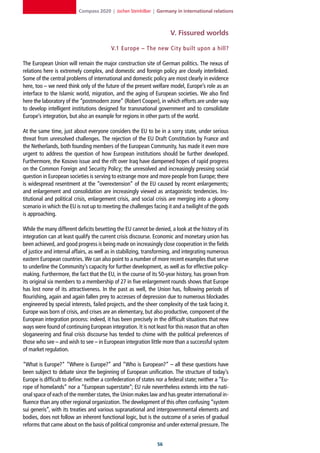
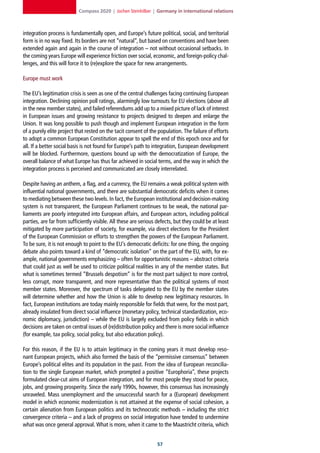
![Compass 2020 | Jochen Steinhilber | Germany in international relations
were used by many European governments to justify their market-driven economic policies,
the “exhausted” population began to perceive Europe less as part of the solution than – in-
creasingly – as part of the problem. Today, between Porto and Prague, the idea of a purely
economic union will not be among the dreams of most Europeans. If Europe has “lost the plot”
(Timothy Garton Ash), the main reason is that it has been unable, as a political entity, to reach
agreement on projects with mobilization potential, and Europe’s politicization has been thrust
into the background to make space for a kind of technocratic pragmatism. “Europe must work”
– in a twofold sense: on the basis of effective and democratic structures and in the sense of
European political initiatives that are visibly geared to tackling the social problems besetting
Europe’s societies.
Foreign-policy challenges
While foreign and defense policy continue to be among the core tasks of national governments,
in recent years the EU has also left its mark on international terrain. This includes above all its
transformation and integration policy vis-à-vis East-Central and Southeast Europe, but also its
military and police missions, its greater diplomatic weight in international forums, and its role
as Europe’s largest donor in development policy and its most important actor in international
relations, advocating a clear-cut multilateralism.46
The EU’s most powerful and most successful foreign-policy instrument is enlargement. The
“lure of membership” (Robert Cooper) has helped to democratize the East-Central European
countries that have now become member states, to pacify and stabilize the Balkans, and to
induce Turkey to alter its administration of justice and initiate economic reforms. The accession
process and the “Copenhagen Criteria” have given the EU a set of potent instruments that it
can use to gain fundamental influence over developments in its neighboring countries, thus
enabling it to contribute to security and stability in its immediate environment.
Despite this all in all successful balance, the EU’s enlargement policy is today more controver-
sial than ever. While the European public has on the whole voted narrowly for EU enlargement,
support in some of the old member states is declining. An EU extended to the east is increa-
singly perceived as a threat to jobs and prosperity, a fact that has found succinct expression
in the – already proverbial – “German angst” concerning the Polish plumber. And the case of
Turkey has led to a nervous debate on the EU’s nature, cultural barriers, and boundaries.
The question of the EU’s boundaries has turned out to be a central aspect of Europe’s foreign
and security policy. Within the EU’s boundaries we find countries that are – despite obvious
differences – rooted in the same modern democratic capitalist system, while outside them we
find countries that function on other principles. For many EU member states, the countries of
southeastern and eastern Europe radiate a vague insecurity – in part because of their lack of
adequate legal frameworks and investment conditions, in part on account of their (seemingly
outmoded) clientist political and social structures, and not least because of their weak econo-
mies. Keywords such as “illegal migrant workers”, “trafficking in human organs”, “organized
crime”, and “forced prostitution” tend immediately call to mind the eastern borders of the
European Union. This situation is aggravated by the many and various unresolved conflicts
there – from Kosovo’s status through the question of the state in Bosnia and Herzegovina,47
to the tensions between Moldavia and Transnistria and the war in Chechnya, which tend to
augment many EU citizens’ sense of uncertainty. Asked what it intends to do in such cases, the
EU finds itself in a dilemma. On the one hand, it could duplicate the current strategy, namely
to mitigate the conflicts and uncertainties in a given region by absorbing its countries into the
46] Christos Katsioulis/Gero Maaß, European integration: Prospects for the future as a security and welfare union, Compass 2020, Friedrich-Ebert-
Stiftung, Berlin, 2007.
47] Britta Joerißen, The Balkans: On war, peace and Europe, Compass 2020, Friedrich-Ebert-Stiftung, Berlin, 2007.](https://image.slidesharecdn.com/compass2010de-100605073420-phpapp01/85/Compass2010-de-60-320.jpg)
![Compass 2020 | Jochen Steinhilber | Germany in international relations
EU – although at present both the EU’s current internal crisis and the ongoing crises in the re-
gions in question appear too great. The sole exception here is the Southeast Central European
countries to which long-term EU commitments have given clear accession prospects, although
their accession seems to be receding further and further into the future. On the other hand, it
could seek to protect itself from these countries along its eastern borders, seal itself off from
them, so to speak – but this is probably not a viable option, not least because of the existing
economic cooperation projects there, not to mention the close relations of some EU member
states to their neighbors beyond the border.48
Against this background – that is, faced with the question of how best to achieve rappro-
chement with these countries in political, economic, and social terms without offering them
membership – the EU developed its “European Neighbourhood Policy” (ENP) in 2002. Initially
conceived with only the countries to the east of the EU in mind, the policy was, under pressure
from the southern EU countries, enlarged to include a number of southern Mediterranean
countries, and now the ENP embraces, in addition to Armenia, Azerbaijan, Belarus, Georgia,
Moldavia, and Ukraine in the east, Algeria, Egypt, Israel, Jordan, Lebanon, Libya, Morocco, the
Palestinian Authority, Syria, and Tunisia to the south. The EU has developed a separate “stra-
tegic partnership” for Russia.
The EU uses ENP in pursuit of its aim of strengthening “prosperity, stability, and security” in the
countries named above, though the focus is clearly on the EU’s security interests. In this con-
nection, the Council concludes that “[p]olitical instability and weak governance in our neigh-
bourhood could impact on the EU”,49 and that ENP should be further expanded, “especially …
considering the potentially high long-term costs of failing to support our neighbours”.50 And
yet the conflicts of interest between the EU and the ENP countries are becoming clearer by the
day, with the latter focusing above all on access to financial aids and to the single European
market. But the EU’s initial hope that the incentives it has provided would set political reforms
in motion in the ENP countries has not (yet) materialized. It appears that the incentives are not
attractive enough. In East-Central Europe and in South Europe the strategy has worked, but it
now appears that it is simply not sufficient to apply EU enlargement policy without its greatest
incentive, namely EU membership, in order to achieve the desired political and social transfor-
mation in the ENP countries. One of the greatest foreign-policy challenges currently facing the
European Union is development of a clear and effective concept for the EU’s external bounda-
ries, one that creates a balance not only between “prosperity, stability, and security”, but also
between EU incentives for and demands on its neighbors with a view to resolving the existing
conflicts of interest by political means. But the approach currently in use – namely to offer a
package of bilateral action plans instead of pursuing a strategy keyed to the special features of
the regions concerned – works counter to this end. Moreover, these ultimately very different
regions are to remain gathered under the ENP umbrella.
It is not only since 2001, or 2004, that security has ranged high on the agenda. Since the Council
meetings in Cologne and Helsinki in 1999, European Security and Defence Policy (ESDP) has
been regarded as part of the Common Foreign and Security Policy. ESDP was touted as the
project of the decade, and it was supposed to give new momentum and political contours to
European integration and develop an attractiveness comparable to that of economic integra-
tion in the golden 1980s, the era of “Europhoria”. In fact, security policy has become – not
least in the wake of an intensified debate on security policy and under the pressure generated
by international crises – one of the European Union’s more dynamic fields, though one in which
there is a wide gap between expectations and (feasible) practice. Long justified less in terms of
48] Michael Ehrke, The European Union and the post-communist sphere: Integration, European neighbourhood policy and strategic partnership,
Compass 2020, Friedrich-Ebert-Stiftung, Berlin, 2007.
49] Meeting of the Council (General Affairs and External Relations) on 18/19 June 2007, http://www.eu2007.de/en/News/download_docs/Juni/
0628ENP/ENP_en07.pdf
50] Ibid.](https://image.slidesharecdn.com/compass2010de-100605073420-phpapp01/85/Compass2010-de-61-320.jpg)
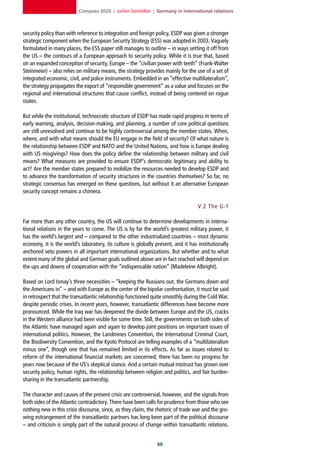
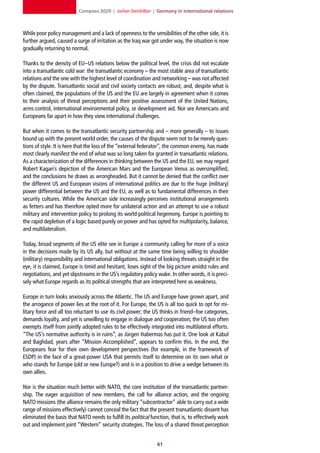
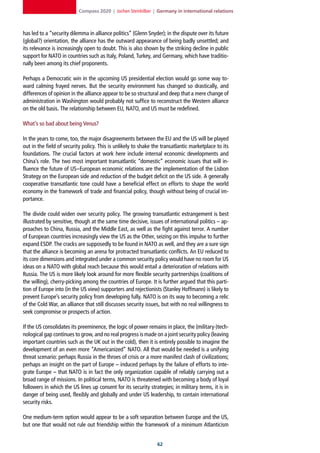
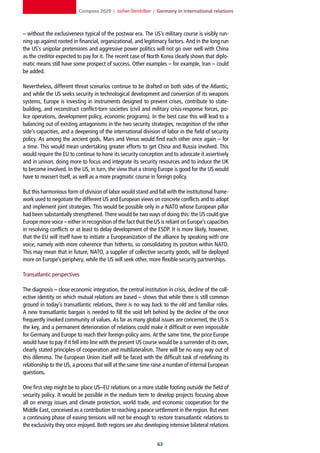
![Compass 2020 | Jochen Steinhilber | Germany in international relations
with other countries, and these in turn affect the relationship between the US and Europe. It
would be particularly important to do more to make relations with Russia (but also with China)
an important part of transatlantic consultations. An enlargement of transatlantic cooperation
to include Canada (and Mexico) would pave the way to gaining a new mediator for difficult
issues bearing on transatlantic relations.51
In future, security policy will remain the most delicate field of transatlantic relations. In the co-
ming years it will virtually impossible for the EU to attain its security goals without the US, and
certainly not against it. However, general attempts to tie European foreign policy to the policy
pursued by the US (as the UK has sought to do) have proven every bit as unsuccessful as att-
empts to establish Europe as a countervailing power, an idea that is generally rejected within
Europe. At the same time, the only way to stabilize transatlantic relations in the long run would
be for Europe to enhance its organization – with a view both to showing more coherence in its
role as partner and to closing Europe’s gates to American cherry-picking. Progress here will be
gradual because Washington would be unwilling to accept any formal restructuring of NATO
on the basis of a two-pillar model and because the idea would have little prospect of finding
consensus among the EU member states. If it strengthened CFSP and stepped up efforts to
focus its resources, Europe would have a more audible voice in transatlantic bilateralism. More
transparency as regards ESDP objectives could in turn help to prevent irritations on the US
side.
V. 3 Our friends and neighbors …
There is every indication that in the years ahead a number of regions around the European
Union will be faced with a very difficult process of change and transformation; its outcome is
entirely open, and it is certain to have an impact on Europe. The situation is tangled and very
difficult: the growing pace and reach of economic globalization; rising demand for energy;
ethnic tensions and conflicts at the seams of the world religions (the preferred playgrounds of
major powers); fragile democracies and authoritarian regimes; social polarization; a “moody
bear” to the east; and the world’s powder keg to the south – all this adds up to a fairly proble-
matic picture. If the impact on Europe is to be minimized and the causes of these risks tackled,
Europe must also develop strategies for and with its more distant neighbors.
A seismic conflict region
Edgar Morin refers to the Middle East as a seismic point where all conflicts are played out at the
same time: the dispute between religions and the conflicts between religion and secularism,
democracy and autocracy, poor and rich, and aging societies and general overpopulation. Like
no other region, the Middle East is characterized by classic territorial and hegemonic con-
flict formations; these would include above all the Israeli–Arab conflict, the Iraq conflict, the
Shiite–Sunni conflict, and the dispute over the Iranian nuclear program. Whether or not these
conflicts are resolved will determine whether the crisis of the “blocked regions” will deepen
in the coming years or some first, halting steps will be taken towards political and social con-
solidation.
The Arab–Israeli conflict is a fundamental one that is not only crucial for Israel and Palestine
but also leaves its traces in the other Arab countries, as well as in relations within the Arab
world. The security situation in the Gulf region was long shaped by the hegemonic conflict
between Iraq and Iran. The most recent Iraq war has altered the security perception of the Gulf
states, and while Iraq no longer poses a direct military threat, its instability is generating new
dangers. Not only has the Shiite takeover of power in Iraq intensified Sunni extremism, but gro-
51] Almut Wieland-Karimi, Transatlantic relations: Together the West is exploring new shores, Compass 2020,
Friedrich-Ebert-Stiftung, Berlin, 2007.](https://image.slidesharecdn.com/compass2010de-100605073420-phpapp01/85/Compass2010-de-66-320.jpg)
![Compass 2020 | Jochen Steinhilber | Germany in international relations
wing Shiite power also strengthens the hand of Shiite communities in Saudi Arabia and Kuwait,
and it could contribute to further destabilizing these countries. Iraq’s weakness at the same
time means that there is no longer a strategic counterweight to Iran. Surrounded by a hostile
US and rivals such as Turkey, Pakistan, and Saudi Arabia, and increasingly dependent on less
than reliable partners such as Russia, Iran, in its isolation, is seeking to play a more active role
in the region. It can base its activities on rent-type revenues from its oil and gas reserves, its
influence over Shiite factions, and a strongly developed national consciousness. Moreover, the
protracted US occupation of Iraq is not only exacerbating tensions with Iran, but at the same
time creating further domestic pressure on the regimes in the Gulf region. The political reform
process is making little headway, above all in Saudi Arabia, the region’s most conservative
and influential country. The leadership of some of the region’s monarchies is in the process of
change, and the pro-American line pursued by a number of governments is fuelling extremist
groups and the political instability of a number of regimes. The escalation of the dispute over
the Iranian nuclear program also shows how far the “West” and the Islamic countries have
already drifted apart and how difficult it is to integrate Iran without at the same time coming
up with a political settlement in the region.
Nearly all the countries in the region are faced with severe internal social and political chal-
lenges. A large number of distortions are further destabilizing these countries – a development
viewed with alarm not least by Israel in respect of a number of countries that are more or less
well disposed toward it. As far as their key economic and social data are concerned, the coun-
tries in the region rank low on cross-county comparisons. With the exception of the energy
sector, the region is very weakly integrated into global markets, and it depends above all on
rent-type revenues from oil and gas; there is virtually no cooperation in the region itself. Its
societies are among the most illiberal in the world. Unemployment, above all among young
men, is very high and is expected to continue to mount in the years to come – fuelled by a de-
mographic development that, in contrast to other global trends, gives reason to expect marked
population growth in the region. Moreover, more than in any other region of the world, (cul-
tural) globalization is perceived in the Arab world as a threat, and it is polarizing the region’s
societies. We can identify a certain “cultural leveling” in the region due to the opening up
in which several of its countries are engaged, as well as the dissemination of new means of
communication and the emergence – for example, in Iran – of a secularized middle class. This
goes hand in hand, however, with a need for cultural autonomy on the part of other segments
of society, which – given a politically more aggressive twist – is used by numerous groups
against the threat of a US-led “Western cultural and value imperialism” that, camouflaged as
universalism, allegedly threatens the region’s autonomy. This translates into a growing risk that
– in addition to the region’s traditional conflicts – we could, in the years ahead, see a further
escalation of internal conflicts that (especially in view of the weapons stockpiled in the region)
could quickly assume military character.
Given the close interrelatedness of these numerous conflicts, regional crises could be defused
only if their root causes were addressed at the same time. This Herculean task is scarcely to
be accomplished without an overall concept supported by the most important international
actors.52 The tasks and approaches that a concept of this kind must comprise are so many and
various that they hardly seem manageable. The window of opportunity for a two-state solu-
tion, without which the region’s core conflict cannot be resolved, is closing due to the region’s
demographic development and Israel’s settlement policy. In other words, the time has come to
launch the final status negotiations. In view of the rule of three widely subscribed to in the Arab
world – “No war without Egypt, no peace without Syria, and no agreements without Saudi
Arabia”53 – the task would be to get these countries solidly involved in the ongoing initiatives,
and not to isolate them; not least in view of the need to stabilize Lebanon and Iraq. It will be
52] Andrä Gärber, The Middle East and North Africa: A gridlocked region at a crossroads, Compass 2020, Friedrich-Ebert-Stiftung, Berlin, 2007.
53] Ibid.](https://image.slidesharecdn.com/compass2010de-100605073420-phpapp01/85/Compass2010-de-67-320.jpg)
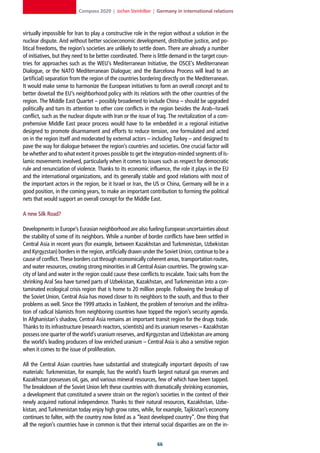
![Compass 2020 | Jochen Steinhilber | Germany in international relations
crease. Like the Middle East, the Central Asian republics have high rates of population growth,
and the large number of young unemployed men there could become a destabilizing factor,
particularly in connection with the harsh methods used by the region’s governments against
Islamic tendencies, an approach that will favor the rise of revolutionary religious movements.
Domestically, the Central Asian governments are no match for the conflict potentials they face.
The region’s defective democratic structures and openly autocratic regimes have – as the recent
unrest in Kyrgyzstan and Uzbekistan has shown – considerable destabilization potential. It is
likely that the political picture of the Central Asian republics will be colored by a marked natio-
nalism, as well as by the spread of political Islam.
Both Central Asia and the South Caucasus, torn as it is by ethnic conflicts, civil wars, and separa-
tist movements, serve their region’s large neighbors as arenas in which to play out their various
interests. Apart from its abundant natural resources, Central Asia’s central geographic location
is an important factor here. Russia is interested in intensifying its North–South relations with
India and Iran; Europe is seeking to revitalize the ancient Silk Road, which led across the Black
Sea, the South Caucasus, and today’s Central Asian republics. The South Caucasus is seen in
Europe above all as an alternative route for energy imports from the Central Asian republics that
would reduce Europe’s dependence on Russia. Along with South Asia and Southeast Asia, the
Caucasus and parts of Central Asia are involved in US anti-terrorism strategies. Russia and China
– which fears that religious and separatist movements might spread to its eastern provinces
– are seeking to use the Shanghai Cooperation Organization, whose members also include
Kazakhstan, Kyrgyzstan, Tajikistan, and Uzbekistan, as a forum to articulate their interests in
the region. Originally founded to improve border security between the former Soviet republics
and China, the organization has also come to be seen – in light of NATO’s eastward expansion
and a renewed US–Japanese security alliance – as a strategic counterweight to US dominance
in Central Asia.
While the EU was only lightly engaged there in the 1990s, in 2007 it responded to the region’s
growing role in world politics and energy policy by developing a new Central Asia Strategy.
European interests are focused on the need to stabilize Central Asia in political and social terms,
which is seen as a precondition for stabilizing Afghanistan. The strategy’s components include
regional security issues, efforts to combat drug trafficking and terrorism, cooperation projects in
the field of education and on the development of an “e-Silk Road”, and further development of
the rule of law, human rights, and democratization. The cooperation is also set to focus on im-
proving the region’s desperate environmental situation – the water issue in particular is seen as
a potential cause of conflict. Finally, the EU is also interested in diversifying its energy suppliers
and the transit routes they use. At present it is unclear how the EU intends to weight and link the
various objectives of the other major actors in the region, which tend to diverge substantially.
While the US would like to see Central Asia move closer to South Asia with a view to seeing Af-
ghanistan supplied with energy, Russia is seeking – successfully – to tie the region to the north.
In recent years the US has lost some of its influence in the region, and the producing countries
see the Russian pipeline as the only option that can guarantee that Central Asian oil and gas
can be exported without friction. Whether or not the new EU strategy will be able to bridge the
contradictory approaches pursued in the region – European/German energy imports via Russia
on the one hand, stabilization of Afghanistan on the other – remains an open question.54 There
is a risk that human rights protection and promotion of democracy could fall by the wayside in
a situation marked by a growing lack of security of supply, mounting concern about Russia’s
development, and the lack of freedom in most Central Asian societies. In view of its lack of real
influence on the social development of the countries concerned, but also of the tough compe-
tition it faces from China and Russia, which do not condition energy cooperation on political
reforms, the EU will find it very difficult to induce its new partners to shoulder obligations. The
“strategic partnership” with the Russian Federation illustrates these difficulties very clearly.
54] Reinhard Krumm, Central Asia: The struggle for power, energy and human rights, Compass 2020, Friedrich-Ebert-Stiftung, Berlin, 2007.](https://image.slidesharecdn.com/compass2010de-100605073420-phpapp01/85/Compass2010-de-69-320.jpg)
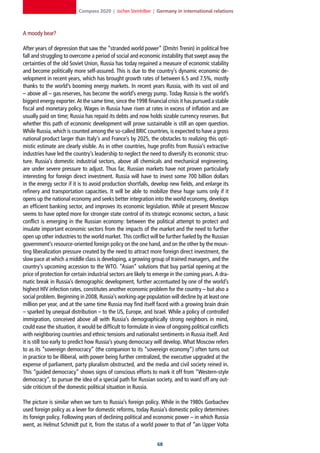
![Compass 2020 | Jochen Steinhilber | Germany in international relations
with missiles” – Russia’s self-confidence in foreign policy has been gradually boosted by high
energy prices, the country’s dynamic economic development, and the growing weakness that
the US inflicted on itself when it opted for war in Iraq. Alongside its “sovereign economy”
and “sovereign democracy”, Russia now wishes to return to a “sovereign foreign policy”. The
former “sick man of Eurasia”, long at the mercy of globalization, is now pursuing a classic policy
designed to achieve its national interest, orientated towards sovereign decision-making, the
creation of spheres of interest, and a multipolar world order. In the early 1990s there were still
expectations that Russia would follow the European example and embark on a Western deve-
lopment path. Today, based on a strict realpolitik, the Russian government is seeking to secure
the status quo. In dealing with the countries on the territory of the old Soviet Union, it uses a
carrot – for countries that work in favor of regime stability and do not openly oppose the resto-
ration of Russian power – and a stick (for example, supply restrictions, boycotts) for countries
given, say, to colored revolutions. It makes targeted use of separatist conflicts in order to desta-
bilize countries, and it vehemently defends – as in Chechnya – its territorial integrity. Moreover,
it judges international settlements in terms of whether they are consistent with the principle
of nonintervention and serve to protect the integrity of the countries concerned; and it uses
the rise of new powers to diversify its foreign policy. The strategy assigns as much importance
to the BRIC countries Iran and Turkey as it does to cooperation with other resource-rich coun-
tries. This will not be a sufficient basis for a “special Eurasian path” for Russia, since no solid
anti-Western alliance appears to be emerging (to say nothing of one under Russian leadership)
and Russia is not powerful enough to go it alone. All the same, there is a danger that Russia’s
foreign policy – encouraged by difficult domestic transformation processes – might drift onto
an increasingly unpredictable seesaw course that would place further obstacles in the way of
efforts to develop stable international relations and improve global crisis management.55
The prevailing conditions are anything but favorable for a close partnership with Russia. While
the Russian government is still officially committed to the policy of a fundamental opening up
to the West that was adopted in the early 1990s, the political style in evidence has increasingly
shifted from cooperative to confrontational. The list of controversies between Russia and Eu-
rope and the US is a long one. It extends from Russia’s iron-fisted policies vis-à-vis some of
its neighbors, a resource-oriented foreign policy and a seemingly never-ending conflict over
NATO and the status of Kosovo, heavy-handed treatment of civil society and the meat boycott
imposed on Poland, to the disputes surrounding the projected US antimissile shield, the ter-
mination of the CFE Treaty, and the recent announcements concerning possible termination of
the INF Treaty. Now that the Russian charm offensive seems to be over, Putin’s Byzantinism has
given the West a frosty sense of unease, while Russia considers any European criticism of the
state of democracy and human rights in Russia as an act of aggression. There is controversy
over the causes and depth of the changes observed in (the style of) Russian foreign policy.
While some see this as a reaction to a deep disappointment at the West’s policies, the growing
rejection of Russia, and growing pressure from abroad, others see in Russia’s more aggressive
policies the clear-cut strategy of a government seeking to secure its power at home by gaining
more influence beyond the country’s borders.
Political ideas on how to deal with Russia are just as divergent. Those calling for a harder
course toward Russia for the most part also, pointing to a lack of shared values and the extre-
mely slow pace of progress on democratic and rule-of-law development, see the concept of
“rapprochement through integration” as a failure and are now calling for more “realism” in
European–Russian relations. This would include the demands that Russia turn away from its
present authoritarian course at home, that Europe show more solidarity and unity in the face of
Russian attempts to split the EU, and that Europe adopt a more self-assured neighborhood and
Central Asia policy, one that could – for example, when it comes to the energy issue – be used
to oppose Russia’s interests. Others see here the risk that Russia might seek to isolate itself and
55] Matthes Buhbe, The main features of a German strategy towards Russia, Compass 2020, Friedrich-Ebert-Stiftung, Berlin, 2007.](https://image.slidesharecdn.com/compass2010de-100605073420-phpapp01/85/Compass2010-de-71-320.jpg)
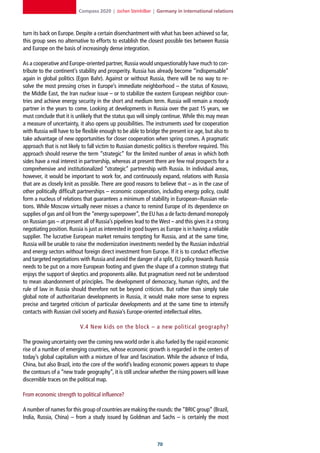
![Compass 2020 | Jochen Steinhilber | Germany in international relations
prominent among them56 (an “S” is often added for South Africa, and the acronym BRICSAM
was coined to include Mexico and the ASEAN countries as well). These acronyms should not
be allowed to cover up the fact that these countries differ considerably in terms of their levels
of economic development, their forms of government and social models, and, generally, their
influence on global politics. This even applies to the four BRIC countries (to say nothing, at
this point, of the larger groups). What we find here is increasingly diversified economies (for
example, China) as opposed to largely resource-driven economies (for example, Russia); aut-
horitarian systems as opposed to pluralist democracies; and more nationally oriented economic
development strategies as opposed to more open economies. Looking at the larger groups of
emerging countries, we find differences over trade policy (for example, concerning China’s
role in Africa and Latin America) or over the makeup of an enlarged UN Security Council,
which appear to indicate that at present there are few joint positions beyond an emphasis on
development concerns. Owing to their sheer size, the pace of their growth, and the degree of
their integration into the world economy, India and China are, among the countries concerned,
surely the only new “BRICs in the wall” capable of altering the basic patterns of global politics
and the global economy.
Despite this heterogeneity, we can identify a number of common development patterns and
features. For BRIC and Co., the starting point and first criterion is a clear-cut surge of economic
development in the countries themselves, followed by a stronger position in the regional and
global economy, with every reason to believe that these countries will continue to consolidate
their position. Several macroeconomic scenarios today indicate that (i) in the years to come the
BRICSAM world will continue to post rates of economic growth greater than those of the OECD
world; (ii) by 2030 – and this is a conservative estimate – the export volume of the BRICSAM
group will exceed that posted by the OECD; (iii) by 2016 China will have advanced to second
place in the world economy, with India moving into third place by 2032; and (iv) in less than
40 years the BRIC economies will be larger than those of the G-6 (US, France, Germany, Italy,
the UK, Japan) (calculated on the basis of GDP/dollar). But development of this kind could be
endangered by any one of a number of factors: structural economic problems, ecological and
social problems, unstable financial markets, protectionism in the US and Europe. Whether or
not globalization will take on an Asian face in the course of the next 20 years remains an open
question in view of these challenges.
The economic rise of China, India, and Brazil has gone hand in hand with opening up when it
comes to foreign-policy issues. Russia, the “stranded world power”, is also using its resource-
oriented foreign policy to intervene more forcefully and self-assuredly in world events. While,
to cite an example, even two decades ago large parts of the globe were largely terra incognita
for Chinese diplomacy, today China – in search of export markets and investors, but above all
raw materials and energy – is forced to assert its interests in regions in which it has traditi-
onally had little strategic interest – including Sub-Saharan Africa and, especially, the Middle
East, where India is now moving to close the gap on its Asian rival. The arriviste powers also
appear to have rediscovered the regional level as a political playing field on which they can
boost and legitimize their claim to a voice in global affairs and push back the influence of other
actors – above all the US. Brazil, for example, has blocked the formation of a pan-American
free trade area and pushed for enlargement of MERCOSUR. But the line between cooperative
involvement and efforts to achieve hegemony, between the needs of a region and the aims of
the leading powers is a fine one. Brazil was the main reason why efforts to stabilize and en-
hance the institutional design of MERCOSUR failed: it was unwilling to cede any sovereignty in
exchange for closer cooperation. And China’s regional engagement is viewed with a distrustful
eye by its less powerful neighbors. China, however, which in the past was more skeptical to-
ward regional cooperation, has recently begun to step up its cooperative efforts with and in the
56] Dominic Wilson/Roopa Purushothaman, Dreaming with BRICs: The Path to 2050, Goldman and Sachs,
Global Economic Papers, October 2003.
1](https://image.slidesharecdn.com/compass2010de-100605073420-phpapp01/85/Compass2010-de-73-320.jpg)
![Compass 2020 | Jochen Steinhilber | Germany in international relations
Southeast Asian regional forums (ASEAN, ARF-ASEAM). By 2010 a free trade area is projected
between China and ASEAN; it would include some two billion people and thus be the world’s
largest. In the Shanghai Cooperation Organization, in turn, China, together with Russia, is see-
king to forge regional ties with Central Asia. That the project is directed not least against the
US is shown by the fact that Iran has, on China’s initiative, been given observer status.
Even against the grain of their regional engagement, several such countries have launched
new initiatives designed to better network their relations. Here too, the driving force is eco-
nomic cooperation, which is reflected in a growing number of bilateral trade, investment, and
technology agreements between emerging countries, but also in regional forums such as the
China–Africa Cooperation Forum or the South American-Arab Summit, which are concerned
mainly with trade, energy, and raw materials issues. Since the failure of the 2003 WTO summit
in Cancún, the establishment of the G-20+ and an upturn in cooperation among India, Brazil,
and South Africa (IBSA) have meant that new Southern groups are now represented in the
global game, and these cooperation projects appear to be both more institutionalized and
more durable in nature. Unlike the approaches adopted by earlier South–South cooperation
projects, these alliances are concentrated on a limited number of issues.57 The G-20+, a group
of emerging and developing countries that represent over half the world’s population – in-
cluding, among others, all the important countries of the South (India, China, Brazil, Mexico,
Indonesia, South Africa, Nigeria, and Egypt) – is focused almost exclusively on agricultural is-
sues, including, for example, US and EU agricultural export subsidies, the opening of European
and US markets, and protection for national agrarian structures. More extensive proposals,
such as one on the establishment of a free trade area among the countries organized in the
G-20+, have yet to be given concrete shape. IBSA also initially focused on economic and trade
issues (for example, trade in generics, free trade between MERCOSUR and India, improvement
of shipping and air routes between these countries, approaches involving joint production of
weapons, and, in general terms, efforts aimed at giving a more development-friendly shape
to the multilateral financial and trade system). But the alliance has also been broadened to
include technology cooperation (for example, on agrofuel production and space research) and
security arrangements (for example, support for enlargement of the permanent membership of
the UN Security Council). In ways similar to the G-20, IBSA is more an issue-oriented alliance
than a fixed political bloc, but its canon of values, which explicitly includes democracy and
human rights, marks this alliance off from China, and IBSA also appears to be rather homo-
geneous in its makeup. How resilient the first shoots of a “South–South multilateralism” will
prove, whether they will continue to be properly tended, and whether the countries involved
will prove able to turn their economic rise to account in terms of growing political influence are
all matters that are difficult to judge at present. However, the challenges to the present core
countries of the global economy that are emerging together with the new powers are clearly
discernible even today.
Integration or countervailing power?
The rise of new economic powers affects some of Germany’s – itself a trading power – fun-
damental interests. While it opens up new chances for new markets, it will also ratchet up
competition for markets and raw materials and increase the pressure for change in global
market institutions. The German Chamber of Commerce and Industry estimates that as early as
2008 China could challenge Germany for its title of world export champion (although German
companies will be involved in roughly 50% of Chinese exports). The new constellations have
already forced the Western industrialized countries to deal with a number of questions, in
particular financial, trade, and energy issues. Roughly the same can be said of climate policy
and a number of security issues. Whether and to what extent the rising powers are integrated
57] Thomas Manz, Allianzen und Gruppen im Global Governance System: Multilateralismus zwischen partikularen Interessen und universellen
Anforderungen, Internationale Politik und Gesellschaft, Heft 2, 2007.
2](https://image.slidesharecdn.com/compass2010de-100605073420-phpapp01/85/Compass2010-de-74-320.jpg)
![Compass 2020 | Jochen Steinhilber | Germany in international relations
politically will determine the viability of multilateralism in the years to come.
Those who still express concern are often referred to the example of Japan, whose economic
rise was accompanied by massive fears in Europe and the US before the country was inte-
grated, more or less smoothly, into the global (Western) economy. Unlike Japan, however,
which was already tied into security alliances with the US, the BRIC countries largely move
outside the Western institutional system.58 It is likely to prove more difficult for the existing ins-
titutions simply to absorb them. And some of these countries’ relations with the US are proving
difficult. Russia and China at least, but also Brazil, are not always seen as like-minded countries
in the clubs around Capitol Hill – although a sense of uncertainty about US policy serves to
unite all four BRIC countries. India was long alarmed over Washington’s close cooperation with
Pakistan; Brazil is unsure about Latin America’s future role as regards the US; Russia sees itself
cut off more and more from decisions that affect its elementary interests; and China is unsure
whether its current good relations with the US are due only to the “war on terror”. There are
still no signs of the “Islamic-Confucian alliance” predicted by Samuel Huntington, and the
paramount strategic significance of Sino-US relations for China’s economic development (the
US is China’s most important investor and largest export market) and security situation (for
example, as regards the Taiwan question) has again and again induced China to join forces
with the US.
In recent years, however, the more active foreign policies of some emerging countries have
increasingly come into conflict with US and European aims. In its dealings with resource-rich
countries in the Middle East and Africa, China cultivates the image of a country that stands up
for national sovereignty and opposes regime change and intervention. With a view to secu-
ring access to resources, Beijing has presented itself, often to isolated countries, as a reliable
trading partner, investor, technology supplier, lender, and provider of development aid. Many
African countries value China’s new role as an alternative monetary fund prepared to grant
politically motivated loans at preferential terms – and without imposing “shock therapy” and
conditionalities attuned to the letter of the Washington Consensus. Bolstered by its oil rents,
Venezuela is also expanding its influence on the South American continent. The new donors
are outlining a development model (a market economy, but authoritarian structures in go-
vernment and society) that, while it flies in the face of the principles of “good governance”, is
nevertheless quite attractive for developing countries, and is even regarded as an alternative to
the models promoted by Western development agencies, above all the World Bank and the IMF
(“Beijing Consensus”). There is every reason to expect these stark differences over the issue of
democracy promotion between Europe and a number of influential countries to grow in scope.
As regards security decision-making too, China and Russia have in recent years increasingly
proved to be spoilers, at least from the Western point of view: Russia’s blockade on the Kosovo
question has long made it difficult to come to a decision. The specter of a Chinese veto has
shielded Sudan from any substantial sanctions concerning its oil concessions. Nor would China
permit any extensive resolution to be adopted against Iran – one of China’s most important
oil suppliers – without a quid pro quo. On the other hand, China’s engagement in finding a
solution to the North Korean nuclear issue has shown how valuable, indeed indispensable, the
contributions of these countries to multilateral strategies may be.
The US and Europe have yet to develop an identifiable strategy for dealing with the new
powers. While the US is seeking to use its nuclear agreements with India to forge closer ties
to a “new power” that is potentially well disposed toward it, its China policy has vacillated
between selective accommodation and a Cold War-style containment rhetoric expressing
alarm concerning an allegedly inevitable Chinese–US confrontation (“Better to be Godzilla
than Bambi”59). Russia and China would be unlikely to find a place in a “concert of democratic
58] Andrew Hurrell, Hegemony, liberalism and global order: what space for would-be great powers?, in: International Affairs, 82/1, 2006.
59] John J. Mearsheimer: Better to be Godzilla than Bambi, in: Foreign Policy, Issue 146, 2005.](https://image.slidesharecdn.com/compass2010de-100605073420-phpapp01/85/Compass2010-de-75-320.jpg)
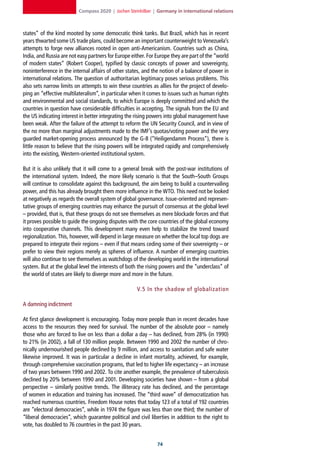
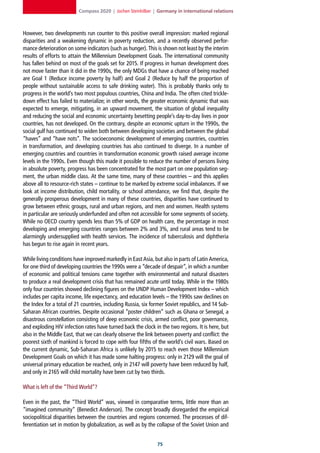
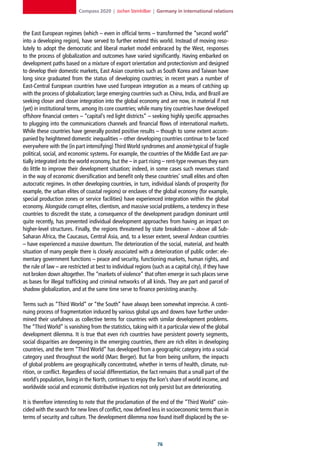
![Compass 2020 | Jochen Steinhilber | Germany in international relations
curity dilemma60 – at least in the eyes of the North. Countries and regions of the South are now
perceived as a security risk, and at the same time classic development problems such as po-
verty, hunger, disease, and environmental crisis are being redefined as security problems with
an unpredictable impact on the countries of the North. Only a distorted view could, without
further ado, diagnose the establishment of a new, uniform concept of the enemy, casting the
South in the role of the new East and switching from Marx to Mohammed. In contrast to the
Cold War, the situation is not that of compact, clearly defined opposing sides arrayed against
one another, nor is there any good reason to expect this to happen in the near future – the
problems involved are too intricate and the interests and coalitions differ too greatly.
But regardless of whether we speak of the Third World as an institutionalized and politically
effective group, the semantic core of the Third World discourse serves as a vehicle of identifi-
cation in international relations. The Third World discourse has been invoked time and again in
connection with recent disputes, from trade policy and the nuclear conflict with Iran, to Hugo
Chavez’s “Bolivarian Revolution”, as a means of calling for solidarity. The background here
is the growing crisis of confidence between some leading countries and regions of the North
and a number of societies of the South. Some of the major development initiatives launched in
recent years have produced little or nothing in terms of results. The Doha Development Round,
for example, is close to collapse, without having reached any appreciable progress for the
developing countries. Millennium Development Goal 8 (Global partnership for development),
too, which is predicated on the direct involvement of the developed countries, has yet to be
implemented. But what best typifies the asymmetry of the North–South relationship is not
only the economic powerlessness of many countries in the South, but also the security-based
marginalization of many of its countries in the wake of the 9/11 attacks.
Many countries of the South “enjoy” the attention of the North only if they develop the poten-
tial to cause chaos (“Chaosmacht ”); that is, if their social, economic, and ecological destabiliza-
tion potential is great enough to impact the international system. The closer this insecurity gets
to the North, the more confrontational, it seems, the methods used in the South to address its
causes. This “securitization” of relations already threatens to occlude the global development
dilemma, even though it points to severe socioeconomic disparities that know no borders,
ethnic groups, and religions and is itself at the center of most global challenges.
In view of the profound changes brought about by the end of bloc confrontation, globalization
and the security-policy boom, it is not surprising that development policy is also faced with
new challenges. The basic problems are still there. Poverty, unemployment, environmental
degradation, violence, war, expulsion, and lack of access to resources – these are among the
factors that continue to determine the lives of a large part of mankind. Yet the altered global
parameters for development policy, strained budgets, and a lack of visible successes again
raise the basic question: Where, when, how, and by whom is development policy to be pro-
vided? The development agenda is the subject of constant criticism from the most diverse
quarters – for its failures and its successes, its limitations and the huge number of tasks and
expectations it is burdened with, its lack of efficiency, its wrongheaded definition of priori-
ties, and for having too much and too little money. Should, as development “saints” such as
Jeffrey Sachs propose, another 75 billion dollars be mobilized to usher in the end of poverty?
Are these, as “development pessimists” such as William Easterly assume, more ideas from the
realm of the nineteenth-century utopians that are hardly suited to illuminating the “heart of
darkness”? Should, as Paul Collier suggests, development policy concentrate on the “bottom
billion”, along with a new trade policy and a robust approach in peacemaking and peacekee-
ping? In recent years development policy has without doubt undergone a marked process of
heterogenization, affecting both its strategies and its actors. Should development policy be
used to flank bilateral relations and support security engagement? Should it pursue a more
60] Dieter Senghaas, Wohin driftet die Welt? Über die Zukunft friedlicher Koexistenz, Frankfurt, 1994.](https://image.slidesharecdn.com/compass2010de-100605073420-phpapp01/85/Compass2010-de-79-320.jpg)
